#they still have souls but it develops in their conception or ‘printing’
Text
Fumes and I got talking and he told me about his factory. Real weird to consider these lil guys are manufactured…
TBH most of it went over my head. Stuff about programs and codes, the reading and distillation of multiversal data. He made it sound like some weird 3D printer that prints out physical goo comprised of binary.
Kinda fucked up but I guess corpos be corpos… and Fumes and I are both happy he exists (´°̥̥̥̥̥̥̥̥ω°̥̥̥̥̥̥̥̥`)
#skelekins speaks#bitty posting#in character post#ooc: i know poes bitties (and maybe others) start from like a soul shard and thats part of why they require others to help seay alive#my bitties dont have that eequirement to give them more opportunities and freedom#they also have magic but its stunted due to size which results in more hyper specializing and utilizing tools for amplification#i imagine undertale univerises on a scale of Soul to Code#so mine are manufactured in a more code-heavy AU instead of soul#they still have souls but it develops in their conception or ‘printing’#idk the exact details shrug shrug#if yoive read this far havr a bugg fact: bugg is prototype baggs butty#they didnt quite get baggs code correctly and as such missed some of his more redeeming qualities#like the desire to help people#also a fumes note i meant to add above: this is why he is the way he is#some sansy data accidentally got mixed into his dataset at conception#peye might be different ;)
7 notes
·
View notes
Text
BEHIND THE BOWS: bread-chan.
While browsing for my fandom post, I came across an interesting poster.. this is the story of bread-chan, who had 1 dream.

She expressed her feelings openly, but maybe a bit too much, as her friend also submitted a secret the very same day.
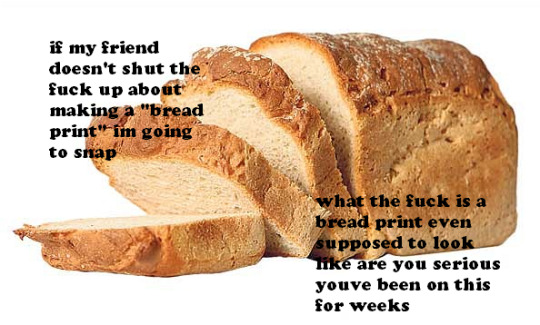
It seems the friend was very tired of hearing about this. Nonetheless, shouldn't friends support each other's dreams?

Look, it made her cry. The very next post, she had to find out about this betrayal. It isn't stupid to want to be a baguette themed lolita. Nothing is too silly for our frills. She had supporters, though.
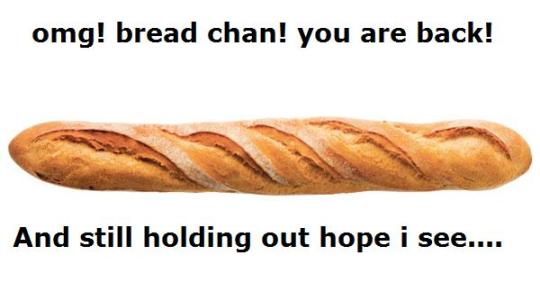
But our protagonist's soul had developed like yeast. Instead of blossoming and flowering, bread chan floured into her anger.
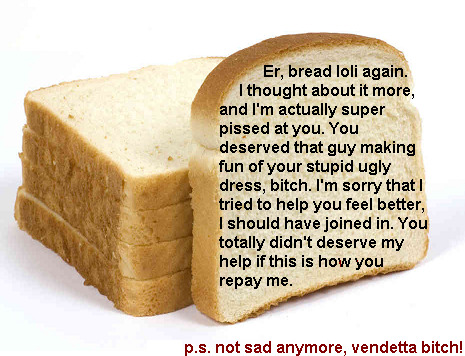
Ouch! Unfortunately for us, I don't think any of the other posts were made by bread-chan.. but her ambition never died. The rest of the year, other posts continued to discuss the bread coord.

Maybe we didn't have a bread dress, but some tried offering comfort..

There seemed to be hope.

And other fashions were already on it.

Close, but still so far!

finally, it ends on this bittersweet note..

I hope bread-chan never left, because..

The Black Ribbon made this corgi bread print.
and we can count on chinese indie brands to deliver weird concepts.
14th Garden 姑娘来买块面包吧 JSK

waa, i feel hungry.. what a happy ending.
#eglfashion#jfashion#lolita fashion#egl#egl community#old school lolita#classic lolita#egl fashion#gothic lolita#sweet lolita#memorybox
102 notes
·
View notes
Text
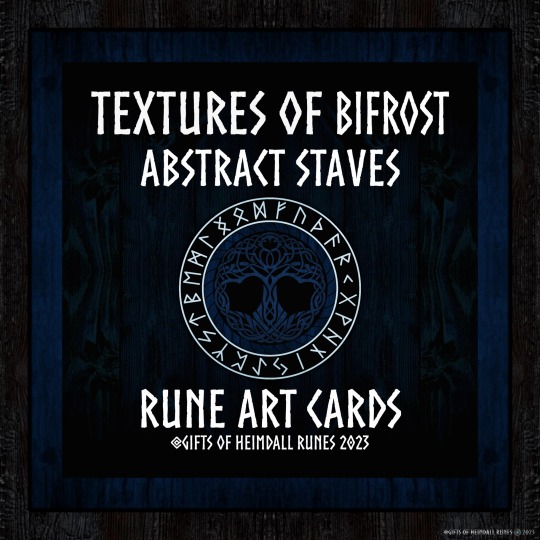

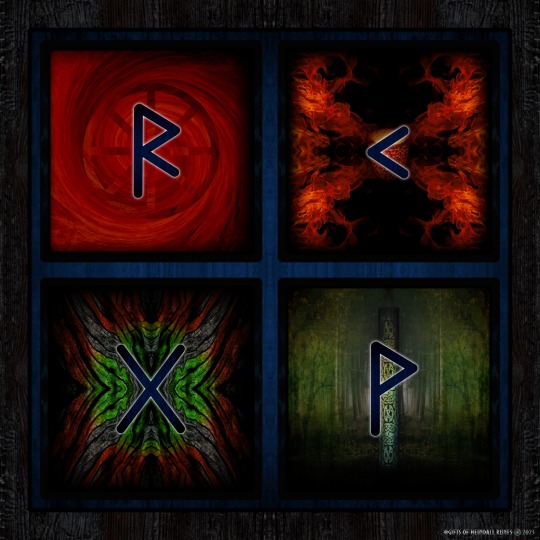
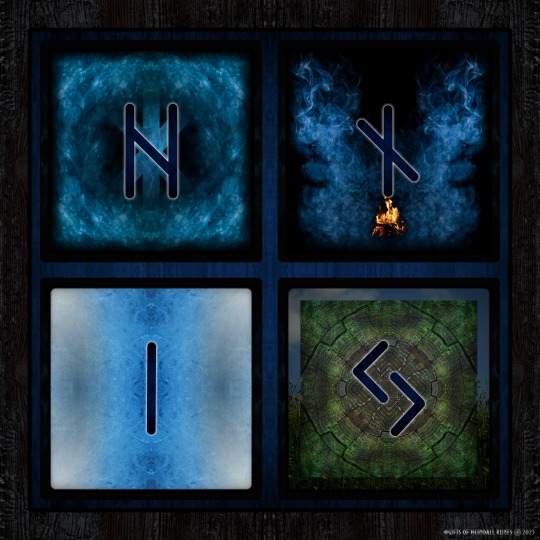

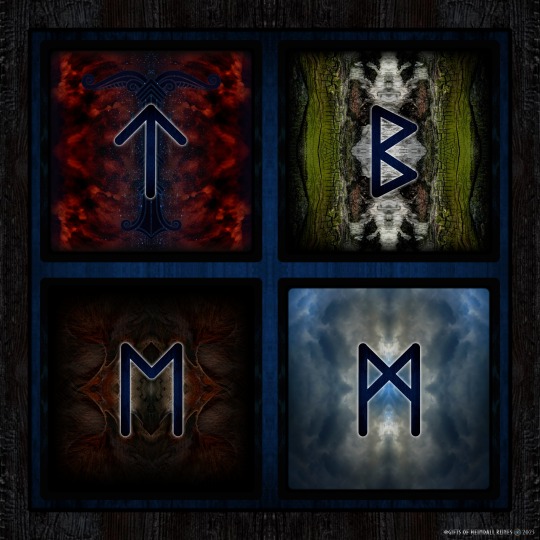

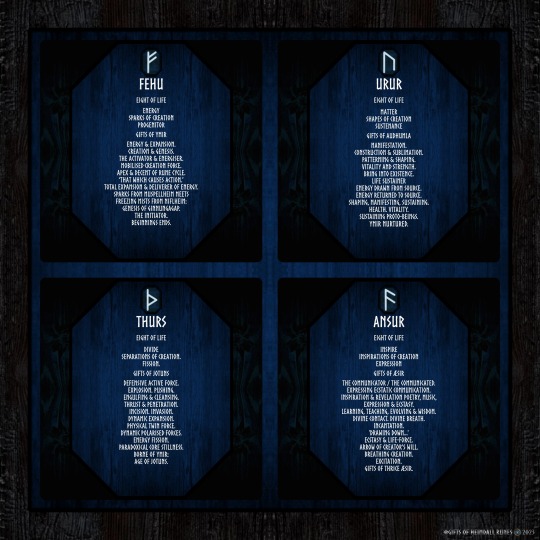

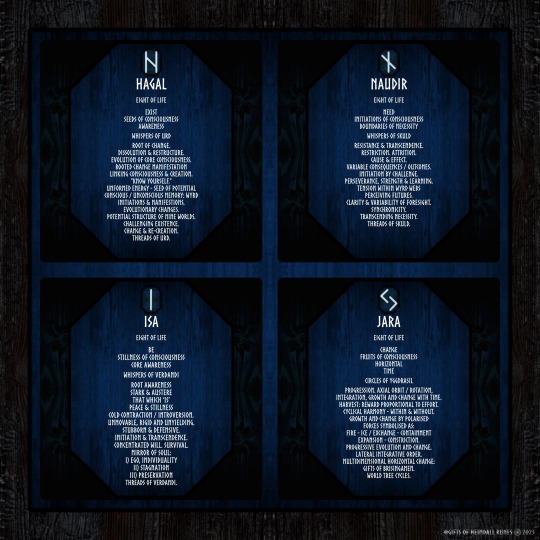

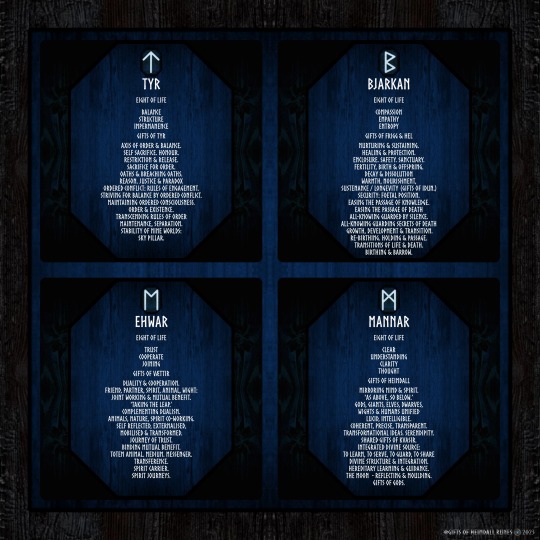
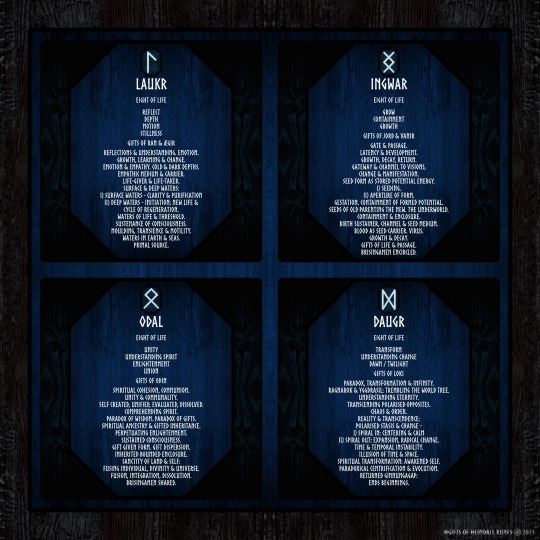
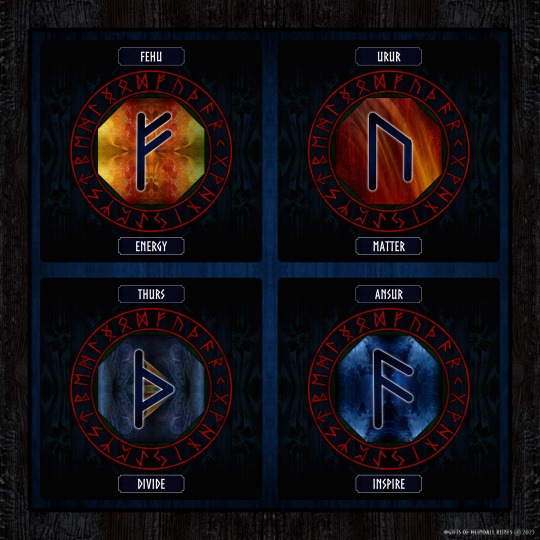
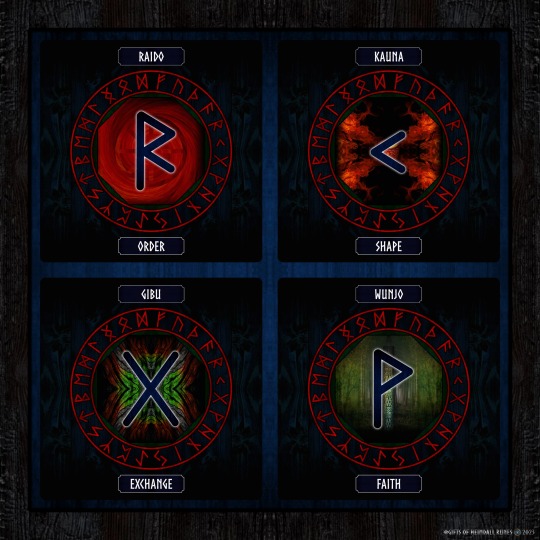
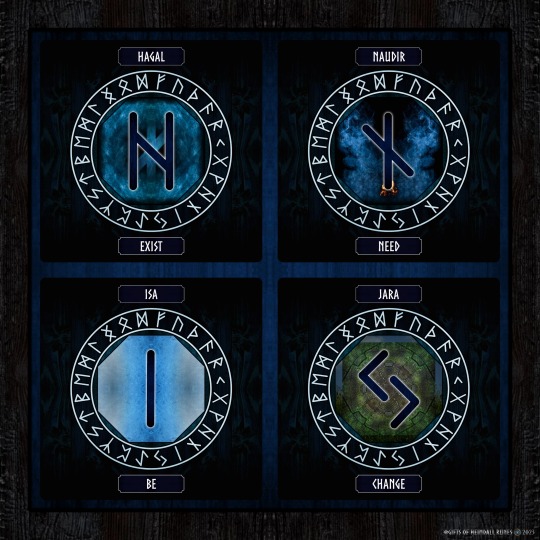
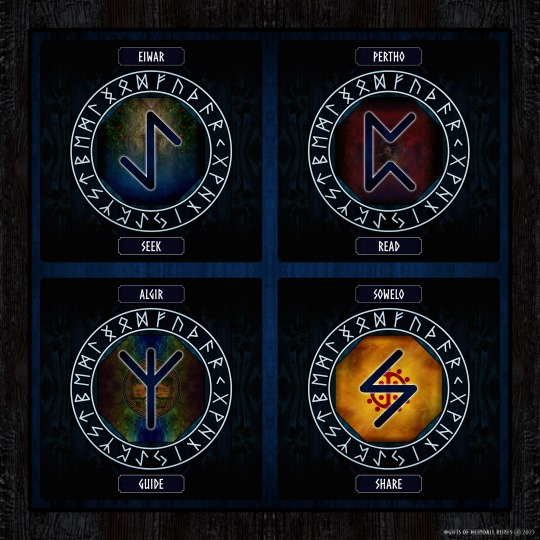

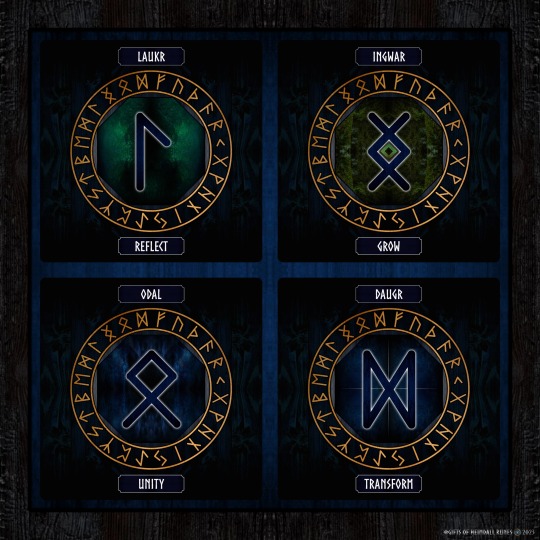
TEXTURES OF BIFRÖST - ABSTRACT STAVES
Elder Futhark Rune Art 2022
@Gifts of Heimdall Runes
●
"Textures of Bifröst - Abstract Staves" shared a rune art journey with twenty-four staves of the Elder Futhark. The project was an attempt to represent interactions with rune energy by creative expressions.
●
These designs were divided into three parts for this post:
○ Textures
○ Reflections
○ Rune Circles
●
The correspondences for runes were created as a gentle reminder of personal rune journeys over time. The text for each rune attempted to represent both a subjective journey within each individual rune and trans-personal initiations following the combined 24 staves of the Elder Futhark (beginning with Fehu & completing with Daugr.)
●
Rune names were taken from Wardruna albums 'gap var Ginnunga', 'yggdrasil' & 'Ragnarok'. The elective use of these rune names represented merely a personal tribute to Wardruna's wonderful music creations.
●
This project celebrated a continued journey with the runes and Spirit inspiration and to perhaps inspire others with their own rune travels. The project was created for fun and should only be considered as a product of a thoroughly eccentric middle-aged imagination that absolutely should know better but was now completely past caring!
●
'Textures of Bifröst' was created on & off within the first half of 2022, then shared October 2022 to March 2023 via social media platforms (Facebook, Instagram & partially Flickr.)
●
Reflections designs showed condensed ongoing personal rune meditations from 1997 to the present. Text showed some personal keywords and phrases formed by meditated interactions with each rune as well as engaging in study from various published authors. Content was also shared on 'Bifröst Shining' but again further developed for these designs.
●
The Brisingamen content with 'Reflections' came into consciousness with 'Bifröst Shining', which was shared 2021 & 2022. The myths and associations therein were still being worked upon. Future developments on this issue may, however, be forthcoming subject to Asgardian relations between Freya & Odhinn mitigated by intervention from Lokean mischief or Heimdallian diplomacy!
●
Collectively, each rune reflection card communicated an understanding of a journey of personal and trans-personal initiation throughout the three Ætts (eights) of the Elder Futhark that I have personally come to understand as:
●
○ First Eight: Journeys of Creation (as described by norse mythology).
○ Second Eight: Journeys Within: Norns and travelling Yggdrasil.
○ Third Eight: Journeys of Soul via the Norse Gods to Ragnarök.
●
Rune Circle cards showed condensed keywords from combined personal rune meditations. All rune correspondences in designs were subjective and should only be regarded as a load of nonsense that blossomed from an over-active aging hippy imagination.
●
Finally, the collection shown here was created for a private published copy by Make Playing Cards (MPC) that was adjusted to accommodate a 3.5 x 3.5 MPC template. The focus for 'Textures of Bifröst' from initial concept was on design, not publishing, which resulted in some slightly different pictures shared on Facebook & Instagram October 2022 to March 2023. Photos of these MPC printed rune art cards are also shown.
●
The project was dedicated to any steadfast followers that have kindly followed this journey with runes since 2019, and perhaps even before. Thank you, everyone!
●
'Textures of Bifröst - Abstract Staves' completed here.
The Gifts of Heimdall journey with runes continues.



Image Ref: World Tree Design
●
Gifts of Heimdall Runes (FACEBOOK)
Gifts of Heimdall Runes (INSTAGRAM)
#gifts of heimdall runes#gifts of heimdall#gifts of heimdall rune art#gifts of heimdall rune designs#HeimdallGiftsRunes#Rune#Runes#futhark#futhark runes#runes#norse runes#elder futhark#elder futhark runes#rune designs#rune art#elder futhark rune art#elder futhark rune designs#rune art cards#rune designs cards#personal rune art#personal rune designs#rune divination#rune magic#futhark rune art#futhark rune designs
33 notes
·
View notes
Photo
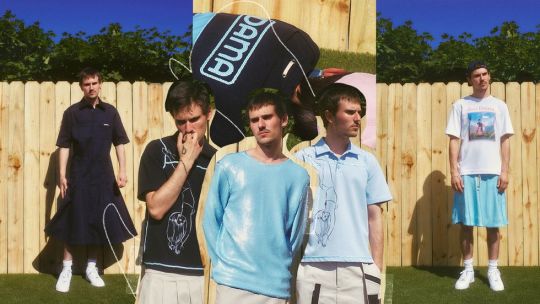
dearDama Is Fashion's Antidote to Toxic Masculinity
Every dearDama piece comes with a special, surprise label attached. “You gotta think for yourself,” one might read, while another could offer something more ambiguous, like “You don’t need confirmation.” This sense of freedom and empowerment runs throughout the indie New York-based brand, which strives to create the antidote to toxic masculinity in our everyday dress.For Cuban designer Ryan Rodriguez, who’s previously worked for brands like Thom Browne, Calvin Klein or The Row, this means achieving balance between femme and masc style codes — a skort made from basketball shorts in bright pink; a polo with the silhouette of a camisole in sequins; a guayabera day dress that resembles the look and feel of classic workwear.Below, PAPER explores dearDama’s “complex interplay between womenswear silhouettes and mens sportswear details,” and Rodriguez’s greater mission to foster a "gentle man" with his fashion.What is the story behind your brand name and how does it play into the clothes?I honestly thought about what the name would be every single day for like five years straight. Ultimately dearDama, is an attempt at addressing the femininity in men. "Dama" means "lady" in Spanish (my heritage is Cuban). My perspective often dwells in the intimate relationship between the garment and the consumer, so your t-shirt addressing you with dearDama, when you go to grab it from your closet hopefully reminds you that whether it’s 100% or 1%, there’s a little bit of lady in all of us.What did you take away from working at major brands that you’ve applied to your own work?I’m eternally trying to improve things, so I mostly learned what not to do with my experiences as a part of any brand, to be completely honest. We all know the entire fashion industry is riddled with inefficiencies and waste, and that struck me the most emotionally. As an example: having to play a part in scrapping hundreds of thousands of dollars-worth of fabric because it wasn’t used and it has a custom print so it can’t be repurposed outside of the company was soul shattering. This [is] probably why I haven’t even made any actual stock of the clothes to sell, some sort of waste PTSD or something.Gender in fashion is being more readily explored among major brands, especially recently. What is dearDama’s own position or statement on gender?This is a big one. Though our culture is making progress, society is still burdened with gender identity and gender expression prejudice. Terms like cisgender and gender nonconforming, while helpful in developing a language for progress, ultimately ingrain division. Culturally speaking, gender expression is the adherence to or away from existing varied but very specific "feminine" or "masculine" constructs. Most individual's gender expression is a lifelong development that is often guided by a slow leaning into a few pre-made archetypes. We experience this with "toxic masculinity," a term that denotes the cultural pressures for men to behave and act in a certain, very nasty way. Propagating negative traits like aggressiveness and dominance, to name a few. However, these archetypes — male, female — aren’t gonna stick around too long because everyone is an individual and everyone falls on their own little spot on the gender spectrum. Now, you might say that sounds like gender nonconforming. But to not conform, there must be concepts to not conform to. Girls do this and boys do that, but that’s not me. I don’t conform to those expectations or standards. That ideology can only exist as long there are expectations and standards to begin with. As time goes on, these expectations will start to blur and fuse even more and you can just be you. Speeding this process up as much as possible is the main goal of dearDama. "I realize there is enough nuance when I myself can no longer judge the gender of the garment."Your designs seem to all balance more traditional codes of menswear and womenswear, like the cami silhouette on a polo or the basketball skort. How do you decide when you’ve achieved enough nuance? Playing with and merging or distorting traditional codes on either ends of the gender spectrum will illuminate areas on the spectrum that are currently unexplored. Socially accepted masculine and feminine clothes are readily available and it's through the dance of those extremes that I hope to create paths to spaces untainted by prejudice. I realize there is enough nuance when I myself can no longer judge the gender of the garment.How do the materials themselves, like sequins, play into this process?The materials are of equal importance to the process as they play an equal part to the gender expression. When it comes to clothes, many silhouettes and materials alike are intrinsically tied to predated gender constructs. If I said to imagine a flowing piece of chiffon on a body, most people would imagine that body as female, because that’s mostly what they have been exposed to thus far. Those are the standards we aim to fade [by] making garments like a tailored jacket out of chiffon instead.Is there a style or silhouette you’ve already created and released that you consider a dearDama staple? Something we’ll see moving forward with the brand frequently?The cami, I'm obsessed with how feminine the silhouette reads. I'm throwing camis on every masculine thing in existence until no one knows what a cami is anymore. Same with a pleated skirt, these shapes need to be devoured by menswear."I'm throwing camis on every masculine thing in existence until no one knows what a cami is anymore."Are there any figures in pop culture you think about while designing? Anyone you’d love to see wearing dearDama?Realistically, I consider people like Bad Bunny or Post Malone — figures who are like-minded and already pushing the mission. But what a dream it would be for some random white 60-year-old politician or even some finance bro fuckboy [in] his silly little suit to wear a dearDama floor-length frilly chiffon gown walking down the street, hand-in-hand with his girlfriend wearing jeans and a blazer. The day that’s an average occurrence and no one bats an eye is the day toxic masculinity has officially lost.How do you think fashion can be a communication tool for achieving a safer world, especially for LGBTQ people?If we can erase the point of reference for what a straight cisgender person wears and how they express themselves through clothes, then the point of reference for the LGBTQ [community] will fade as well. I believe it needs to be done in this order as it's typically the non-LGBTQ community that is doing the judging. So once the non-LGBTQ community no longer has a sense of what normal and different means to them, gender prejudice will be eradicated worldwide.What larger impact do you hope dearDama has on culture, outside of fashion?Every step towards peace and the lack of judgment on others is a step in the right direction. Pushing culture even one step towards a more accepting mindset would be a dream come true. Photography: Mikey Asanin Styling: Daniel Gaines Model: Maximilian Isaacs
https://www.papermag.com/deardama-toxic-masculinity-2659557318.html
#Deardama#Fashion#Lgbtq#Gender#Thom browne#The row#Calvin klein#Ryan rodriguez#New york#Nyc#Justin Moran#PAPER
0 notes
Text

❝YANDERE❞

Synopsis; What they’d be like as yanderes.
Featuring; Kokichi Oma, Mikan Tsumiki, and Nagito Komaeda x GN! Reader
Warning(s); Yandere themes, manipulation, gaslighting, drugging, somnophilia, stalking, nonconsensual photographs, worship, masturbation, and sacrilege. (These are pretty long headcanons/imagines!)

➤ KOKICHI OMA
⤷ To his very core, he’s a cunning, paradoxical individual. Kokichi derives from fantastical ideals; daydreams of a world in which his interest remains piqued.
⤷ He hates boredom, such emotion is merely viewed as unforgivable in his eyes. And he’ll do all that he can to ensure he’s enjoying himself; to ensure he’s entertained.
⤷ So, as to be expected, he’s enamored for all that is able to provide him such recreation. Thus why he began to develop the buddings of interest towards you; you kept him on the tips of his toes, eager with anticipation.
⤷ But he wouldn’t push forth and pursue after the claim of your heart through confession.
⤷ Why? That’d be too boring, of course! Confronting you with an admission of how he feels towards you would be nothing short of monotonous. Much too bland for the tastes of an Ultimate Supreme Leader such as himself.
⤷ And what would be more fascinating other than watching the gradual rupture of the human mind? Especially the mind of the one who held his heart captive.
⤷ Thus the game of cat and mouse had commenced, caging you in the cycle of a game you never wanted to be a part of; all to entertain the one who claims to adore you. But you wouldn’t believe that. Nobody would. He’s a liar, through and through.
⤷ Kokichi is as deceitful as a bat is blind. His sly nature proving to be merely his asset in order to conquer over you as his pawn.
⤷ He’ll wreak his havoc over you. Instinctively, he’ll begin with your mind, toying with all that you believed and knew in order to tug the rug beneath your feet.
⤷ He promises that he truly does love you and cares for you beyond anything else. But with his reputation, it’s nearly criminal to believe the lies that spill from his mouth; you should know this, he doesn’t care for you. It’s lies, lies, lies!
⤷ But Kokichi knows just how you think, an invasion of privacy to the encompass of your thoughts as he plagues every inkling of doubt.
⤷ His behavior towards you differs from the others; from everyone, either of you knows. And you can see it too, he makes sure you’re aware of it.
⤷ He makes sure you’re aware and acknowledges the sheer contrast of tone when conversing with you in favor of others. To you, his words hold a playfulness that’s comparable to being juvenile; boyish.
⤷ If anything, his banter with you could be described as soft. Well, as soft as Kokichi could ever be associated and described as.
⤷ But you’re aware of how the sharp daggers of playful insults are with that of a dull blade, merely a poke in good fun. Yet with others, his words possess an animalistic, carnivorous bite.
⤷ You knew that he sought to submerge himself under the skin of others, irritating them to the point of grit teeth and yanking of their hair, tugging their scalp raw.
⤷ However, you began to believe those weren’t his intentions with you. Dare you say that perhaps Kokichi didn’t view you as the prey to his jabs, but rather as someone he’d prefer to expose his care towards.
⤷ It warmed your heart, these assumptions of yours. And thus you believed them; you believed the wholesome thoughts that the young male truly did enjoy your presence and valued you.
⤷ You believed what brought you the most comfort, and perhaps that was where you were fatally mistaken.
⤷ As soon as the belief that he cared for you had sunk into your mind, he’d escaped your clutches of familiarity without a trace; hardened glares, crude insults.
⤷ Upon the moment you thought you had begun to understand him, he morphs into someone unrecognizable. It was as though you never knew him in the first place; as though you never knew Kokichi.
⤷ And with the hope of finding what you assumed was the Kokichi you knew, you attempted to withstand the cold, blatant detachment of his eyes as they meet your own. You pushed forth the barricade of insults and attempted to reclaim your ideals of Kokichi’s care; to reclaim someone you prayed even existed.
⤷ It was through the hope that you began to notice the inklings of care and acknowledgment seeping through him. It seemed that you’d finally be met with the Kokichi you’ve come to love; the one you’re able to recognize.
⤷ His insults that once pierced and mauled into your heart like the canines of a beast, chewing you apart and tearing you to mere shreds were now an obvious jest; one that attempted to retrieve a giggle from you rather than a sob.
⤷ And at long last, it seemed as though you were able to calm yourself. You’ve retrieved the comfortable attachment you’d acquired from Kokichi, and now you find that there’s nothing to worry about.
⤷ You feel safe; relieved. The title of friendship with the prankster himself wasn’t one you’d ever taken lightly.
⤷ So when he throws you for a loop—a vicious cycle—of indifference and then care, your heart was split relentlessly. The wounds healing only to be torn open, their stitches tugged out as fragments scattered your withered mind.
⤷ To his enjoyment—his sick, twisted delight—your mind was being built up only to be knocked down; familiarizing you with the mind fuck of an attachment he’s forced upon you.
⤷ It was cruel. His malicious intents unbeknownst to you, yet tauntingly clear.
⤷ Kokichi Oma is a liar, through and through. His tongue dipped in the silver coating of falsified hope for his words to stain themselves within.
⤷ But his adoration is an unbreakable truth sketched with the ink of his promises in the fine print. His love for you is real, as is proven by the inscription in contrast to mere words hanging in the air disguised as wishful whispers.
⤷ Though as true as his love is—as true as his devotion to you may be—he wouldn’t dare admit it to you. At least, not the first between both of you.
⤷ Regardless of how far gone down the plundering realm of love he was, he wouldn’t utter the words you crave to have confirmed until you pursue him first. His pride is an angry, green-eyed villain, one that holds his confession hostage at the back of his throat as he toys with you; toys with your mind.
⤷ And as tough as you make yourself to be—head held high with an unfaltering smile resting upon your lips—he’d break you down eventually. The longer he plays, the more interesting your reactions become.
⤷ Your erratic, borderline deranged hysteria at being left behind once more as he provides you nothing more than a cold shoulder is so, so amusing.
⤷ He’s perfectly aware of your desperation as the cycle of his cruel ways repeats once more, just as you’re aware of how you’re on the brink of falling apart if you’re left behind once again.
⤷ So with a long-forgotten pride that’d been swallowed as easily as a pill, you find yourself situated before him, eyes spilling over with tears.
⤷ You beg, and you beg, and you beg. Over and over until the words that fall from your lips hold no other meaning than please don’t leave, not again.
⤷ And with that, he’s satisfied. His patience having been run through the mill as he waited for the eventual breaking of your mentality, enough so to have you on your knees begging for his affections.
⤷ He’s aware of how malicious it is. How toxic he had been to put you through a maddening cycle of love and loss to acquire your sacred words of desperate devotion; your pleas for his returned affections.
⤷ Now he’s sure, so very sure, that you won’t leave him. You simply can’t. You came crawling to him first, you came begging for his love first, you came to him.
⤷ You wanted to be with him first, he never made such advancements. At that very moment, you’d sealed yourself to him, encasing yourself within the mousetrap as Kokichi’s grin held genuine care with the faux silver lining of deceit.
⤷ He’ll be sure to remind you of how easily he could leave you, much like the cycle he’d put you through. He’ll be sure to engrave it within your mind that you mean nothing to him.
⤷ Of course, that’s a lie! But you wouldn’t know that. He wouldn’t let you know that. If you even try to search for the truth within his devotion and adoration, he’ll put you in your place; you begged on your hands and knees for his mutual love, you confessed to him.
⤷ Kokichi Oma is a liar, that much is certain. He’s a cunning and paradoxical individual. His words tethered with insincerity and cutting into whomever he targets.
⤷ Yet there’d be no greater truth to be uttered by him other than that he loved you, he truly loved you.
⤷ But you wouldn’t know that. You wouldn’t know that was the truth amidst the Atlantic sea of his falsehoods, each picking apart at all that you believed was true. All you knew was that Kokichi Oma was a liar, through and through.
➤ MIKAN TSUMIKI
⤷ Her entire existence had been the heart of inconvenience. The world tossed her aside as though her life were nothing but a hassle, her survival proving futile to anyone and everyone; she was alone, and not a soul cared for her.
⤷ Her instincts were derived from being abandoned. In the lifetime of Mikan Tsumiki, abandonment was inevitable. Being left behind is merely the dissonant outcome of trust and interaction.
⤷ And thus, she’s untrusting. As it’s been engraved into her mind, if you are not needed, you will not be wanted.
⤷ It’s been a concept—an idea—that she’s been forced to bear. If others weren’t given a reason to need her, to rely on her, they’d find no use in her. This was the harsh reality Mikan had been forced to instill within her mind.
⤷ Yet, despite the harsh and unforgiving pains of betrayal within her life, she still found herself falling for the fragments of care you provided her.
⤷ Perhaps it was within your nature to be kind; to be someone that surrounded others in the warmth of your presence as you soothed their worries momentarily.
⤷ Mikan wasn’t one to trust easily, but she was one to love. And when she falls into love, she devotes herself with every scrap of her pathetic life she can muster.
⤷ Her heart swells in remembrance of how you appeared upon first meeting her; meek and fragile. Though that was to be expected, you were in the nurse’s office with reasoning, of course. A fever, a rather high one at that.
⤷ With Mikan’s status as the Ultimate Nurse, she took care of you. Providing you with a damp washcloth to regulate your temperature as she shuffled to retrieve your medicine from the cabinet. It was an ordinary occurrence, her daily life as the trusty nurse after all.
⤷ And yet the most peculiar thing had occurred amidst the most ordinary of days. As you lay gasping from the heat your very own body radiated, you still found it within you to meet eyes with Mikan.
⤷ She could tell how difficult it was for you to remain conscious, your body exhausted from attempting to preserve itself, yet you pushed yourself to give her a sincere smile. A passive thank you escaping your lips before an exaggerated sigh followed, and your eyes fluttered shut.
⤷ For a moment, she swore her heart had halted thumping, her breath catching within her throat. Was she hearing things? Had she managed to catch your fever in the few minutes of reach with you and experiencing some sort of hallucination?
⤷ Hundreds, if not, thousands of thoughts and excuses passed her mind before she settled; you had thanked her. Pitifully enough, this had been a first-time occurrence and one that stuck with the young nurse.
⤷ You were sent home that day. Yet your nearly inaudible whisper of gratitude echoed within Mikan’s mind as though it were a blaring alarm signaling for her to wake up.
⤷ But as always, she assumed that as soon as your eyes had shut, your moments together had concluded. She never expected to see you again, much less speak to her, and yet she was sorely mistaken.
⤷ There you stood before her, eyes trained on her own lavender hues. A smile tugged at the corner of your lips as you spoke, your words barely registering in her mind. Her mind occupied with the realization that you sought her out, you searched for her, you took time out of your day for her.
⤷ She manages to hear the end of yet another thanks, another voiced gratitude towards her as you smile.
⤷ The same smile that forces her to appear akin to a deer gazing at headlights. She was frozen momentarily and struggling to comprehend what’s being told to her.
⤷ Her first instinct was to apologize; to beg for forgiveness. Yet she had no reason to apologize, you’d just thanked her, after all. But it was an instinct and one that consumed her.
⤷ Thankfully, you weren’t looking for words to be sprouted back to you. Instead, you left with the same treasured smile on your lips that you’d blessed her with.
⤷ And with that, Mikan had deemed that the last of your meetings. It was inevitable, no matter the circumstance.
⤷ Life was run on a clock, a timed death sentence as every being awaited their own demise. Nothing was forever, not unless it were in death. And Mikan doubted she’d find someone who’d love her in life, much less even in death.
⤷ Though Mikan, yet again, finds that she is proven wrong. Not that she assumed she was right, anyway.
⤷ But the two of you meet again. This time under circumstances that she had hoped to avoid. It was a common occurrence, almost as common as her being found within the vicinity of a medical center; being picked on.
⤷ This was the closest thing to friendship Mikan had managed to acquire. Hiyoko had always had a sharp tongue, regardless of friendship status, her sharp words would still sear through and pierce into the hearts of whomever she preys upon.
⤷ And fragile, meek little Mikan was a typical victim to these harsh words. Every insult stabbing through her stitched heart, threatening to tear open the wounds once more.
⤷ Mikan was familiar with embarrassing moments. Her clumsy antics landing her in positions she prays to forget. And yet, she’s constantly attracting further embarrassment; much like her own pitiful existence she relentlessly apologizes for; apologizing for existing.
⤷ But having you witness her being torn down by the blonde had been an entirely new tidal wave of embarrassment. You, of all people in the forsaken academy, had seen her in her weakest moments.
⤷ She was familiar with being viewed as weak. She knew, herself, that she was an easy target, one that required minimal effort to instill rue within.
⤷ She was aware of them much like those around her were. Yet she didn’t want you to be aware of this knowledge; of this fact.
⤷ In the moments she’d known you, she had been at her most collected. Assisting you and nurturing you back to health as much as she could. She appeared as strong as she could be; as strong as she could ever be. And all of that strength displayed would mean nothing once you bear witness to how pitifully pathetic she truly is.
⤷ Would you prey upon her as well? Would you seek out her weaknesses and tear into them with your canines as though you inherited an unfathomable, animalistic hunger? Would you hurt her too?
⤷ It was then that her true infatuation had been birthed. Her yearning to love and be loved pulsating within her barren heart in which was deprived of genuine care. She felt the beginnings of a chance, the dispersion of her despair.
⤷ Your abhorrent gaze fixated ahead of you, and to Mikan’s relief, it wasn’t directed towards her. You gazed at Hiyoko with the flames of Hell itself raging in your eyes. Pure, unaltered anger burning a passionate fire.
⤷ It was all akin to a butterfly effect; a chain of events as a result of a singular action.
⤷ Mikan wasn’t sure where the chain had begun, but she understood that the flaps of the butterflies within her stomach weren’t in relation to sickness.
⤷ Of course not, she took excellent care of herself. But regardless, these flutters were delicate; ever-so soft. So much so, she swore they even tickled.
⤷ It was the first bloom of the garden of her potential devotion to you; the garden in which is littered with thorns—poisonous thorns—awaiting to prick at those unfortunate to be subject to her adoration.
⤷ And to your unaware dismay, that poor soul just so happened to be you; the same blissfully oblivious individual assisting the young nurse from her position on the floor after having been kicked by the antagonistic blonde; Hiyoko.
⤷ Much like the first blossoming of her feelings for you, that very moment had been the beginning of your friendship. Hand-in-hand as you walked her back to her house, only separating at your respected stops.
⤷ For every second you held her hand in yours, Mikan’s heart spun all the way to the moon.
⤷ If only you knew what you were doing to her and her poor little heart. If only you knew the nightmare you were brewing for yourself.
⤷ The walks home together soon turned into grabbing a bite together as well. Rather than obligation, it was a decision; one that you indulged in. And Mikan found herself swooning with hedonistic desire, a dangerous swirl of obsession within the cocktail of her love.
⤷ It was times like those that Mikan thanked her ability as the Ultimate Nurse. Having been accustomed to most prescriptions and symptoms, she was relied on by those who found themselves ill.
⤷ Much like you did when you claimed that you’d felt the slightest bit dizzy as the two of you walked home together, sipping on your drinks that Mikan had offered to fetch for you both; reciting your usual order as though it were the lyrics to the popular radio songs.
⤷ She asked you the typical questions, or well, what you assumed was typical. You wouldn’t question the nurse in her own field. You trusted Mikan to know what she was doing, leaning against her as your head grew foggier.
⤷ She had taken you home, assisting you up the stairs with an arm slung around her shoulders. Your breathing slow, nearly inaudible as you suppressed the urge to cave into a deep sleep.
⤷ With delicate care, she managed to tuck you into your bed. She scurries about in your room as you eye her with a fluttering gaze, stars littering your vision.
⤷ It wasn’t long before you’d shut your eyes without another worry. You’d assumed you were merely exhausted, a reasonable explanation. With the amount of testing you’d done that same week as a result of the semester coming to an end, it’s no wonder you’d be so worn out.
⤷ And being in the presence of the young and ever-so-talented nurse, Mikan, you knew you didn’t have anything to worry about. Mikan would take great care of you, without a doubt!
⤷ So when you woke up to find her sitting on the edge of your bed, peering down at you with a smile so soft—so sincere—you swore you couldn’t differentiate if it was the warmth of the blanket or the blush that was overwhelming you.
⤷ Mikan was truly so kind to you, treating you with such care and assuring you that you’d feel A-Okay under her watchful eye.
⤷ Before leaving, she lets you know she’s going to go fetch you some tea. She claims it’ll be easier on you and the herbs will provide you with an organic remedy your cells will be delighted to indulge in; whatever that means.
⤷ Yet as she stands by the door, she turns to you with a gleam in her eyes, one that you should’ve paid closer attention to as she asks you; would you like sugar in your tea?
⤷ You nod your head, signaling to her that you’d prefer having your tea sweetened.
⤷ Laying your head back down onto your pillow, you sigh as you allow yourself to relax once more. Truly submitting yourself to the care of your dear friend, Mikan.
⤷ After all, she only wants to do what’s best for you. She’s the nurse and you’re her patient. Who are you to question what she’s doing?
⤷ Even as Mikan rips open a miniature packet of a granulated white substance—gamma-hydroxybutyrate—a fine powder appearing akin to sugar, but is most definitely not the ladder. Though you shouldn’t bother worrying your little head over it.
⤷ Mikan knows best, Mikan knows best, Mikan knows best, Mikan knows best, Mikan knows best—
⤷ And it’s through blind trust—the very same trust that Mikan had shunned yet you embraced so easily—that you sip the tea Mikan had prepared for you. Merely biting back the scrunching of your features at the odd salty taste with a soapy undertone.
⤷ Mikan had always been a bit clumsy, so surely she must’ve simply mixed grabbing the salt rather than the sugar. Your mind rejecting any assumption that was anything other than that; you trusted Mikan. She wouldn’t do anything to harm you.
⤷ So as your head fogs further, your eyes drooping once more as the world grows darker, Mikan takes your cup from your hands and sets it on your nightstand.
⤷ Your body seems to have a mind of its own as you find yourself unable to move, your consciousness slipping before you could comprehend what’s happening. Though it’s not like you’d even steer your thoughts towards the bitter truth.
⤷ You trusted Mikan, you believed in her and the kindness of her actions, and the sincerity of her care.
⤷ And before fully submerging in the clutches of a deep slumber, you can feel the slender, wistful hands of another cradle your skin, squeezing and familiarizing themself with your figure.
⤷ As your eyes finally fluttered shut, your last sight had been of Mikan—your dear, trusted friend—hovering over you. Her lavender-hued gaze painted over with a sickening lust as her cheeks were flushed. Her visage is that of a crazed, lovesick fool.
⤷ The storm of Mikan’s obsessive love had been brewed. Stirred into a whirlwind of singed rose petals in which blood stains the thorn of the torn flowers from within her garden of despair; her heart torn to shreds only to be stitched together once more.
⤷ You, her beloved, are caging within the brambles of her desire. As her lips ghost over your unconscious form, suckling on your plush skin that she fawns over with such feverish admiration.
⤷ Her hands wander, and they wander, and they wander; she can’t get enough of you. She’ll never get enough of you. She’s truly a fool, disillusioned by the possibilities—the hope—love provides.
⤷ She’ll take all she can get. She’ll take every ounce of affection you have to offer. Her grasp clinging onto your body, stealing what unexplored regions you have to offer. Her yearning pushing her to take more; to steal all that she can, in the name of your love.
⤷ But it’s alright. After all, you won’t remember a thing once you awaken. And she can do it again, and again, and again.
➤ NAGITO KOMAEDA
⤷ In his love-stricken eye, you were ethereal. A beam of absolute hope, relinquishing despair and paving a path for the greater good. In his eyes, you were more than his hope; you were his god.
⤷ He hailed your every word; your every step; your every notion. Anything you do or say, he follows with every bit of his culminated devotion.
⤷ He saunters behind your lead, his head dazed with the true belief in the words that leave your mouth. You were never wrong. You were flawless in every form imaginable. You were perfection personified.
⤷ His devotion spiraled from your overwhelming optimism. Your positive energy seeping into the heart of others, as seen within their visage.
⤷ You were the embodiment of true hope, his one, and only. You were his beacon of light shining towards a better tomorrow.
⤷ And he swore there wouldn’t be a day in his miserable, worthless life that he wouldn’t cherish your very existence.
⤷ He swarmed his lifestyle with you, you, you! His fixation manifesting through his every action and train of thought. Anything he did, he did it for you.
⤷ So when he began observing you from afar, eyeing you as you go about your daily life, he swore up and down it was for you. To truly invest in you; his hope—no. His god.
⤷ You didn’t notice his presence lurking behind you at almost all hours. But, of course, you wouldn’t! He wouldn’t dare hope for someone of your elite status to pay heed to mere scum like him; like everyone around you.
⤷ Nagito was as self-loathful as he was jealous. Though he wouldn’t dub such turmoil as jealousy. Someone as lowly as him had no right to be jealous. You’d never associate with someone whose worth is that of garbage.
⤷ No, no. You’re better than that. You’re deserving of far more than that. You were a deity. You reigned over filthy nobodies much like him, casting hope upon everyone no matter how meaningless their existence may be.
⤷ So it was only natural he’d feel such a searing, blazing burst of repugnance at the audacity of people. The audacity of society. To see the way strangers so easily conversed with you, so carelessly interacting with you.
⤷ Were they not aware of your ethereal mien? Were they not aware of who they were speaking to?
⤷ Nagito found it nauseate. Witnessing so many nugatory nobodies engaging with you yet holding no regard to just how valuable you are; to your aristocracy.
⤷ Truthfully, he thought of it as a miracle that you would speak to those so invaluable. But that’s what pulled him—like a magnetic pole—to be enamored by you.
⤷ You were so hopeful. You sought the beauty of everything and everyone your treasured gaze laid upon. You discovered hope within the most purposeless of entities, and he could only fantasize the hope your beloved eyes would seek out within him.
⤷ But he merely dreams of such a thing. Never would he dare pollute your valuable time and existence with the thought of his irrelevant self. He was nothing, and he sure as hell was below even a nobody to you.
⤷ So he watched, and he watched, and he watched your every move. His ghostly green hues trained on your form, from any and all angles.
⤷ Anywhere you were, he was as well. Trailing behind you was as common as your very own shadow. He promised he’d follow you to the ends of the Earth. If his hope would allow, he’d do anything and everything to pursue complete allegiance.
⤷ He sought to appreciate and worship the entirety of your existence. For as long as you lived, he hoped—oh, how beautiful hope is to allow him to dedicate his life to you—he’d treasure you entirely.
⤷ His days spent following behind you, avoiding being seen by the public eye, or rather your eye, had soon evolved into beyond that of just following.
⤷ Much to Nagito’s dismay, he harbored fragments of bitter selfishness. Atrocious, it truly was. How could someone as lowly—as much of a scum as him—possibly writhe in selfishness?
⤷ He was already undeserving of being within your shadow, following you home. Yet he still had the shameless desire to yearn for more. Sickening; he could only be further disgusted by his miserable existence.
⤷ But he couldn’t help himself. Someone as faultless as you was meant to be obsessed over, right?
⤷ And thus, he began to take pictures. Photographs of his beloved hope—his god—saved within his phone.
⤷ At first, he was shaken beyond his own comprehension of the impudence to take a photograph of you, especially with photography skills as shameful as his. But still, much as he expected, even through his worthlessness you had shone; you looked absolutely beautiful in each and every shot.
⤷ His collection of photos only increased with each passing second. Soon enough, his fingers instinctively curled to the dimensions of his phone, readily waiting to snap a picture of your radiance.
⤷ It took a singular day to accumulate one hundred photos, and after a week he’d managed to possess well over seven hundred photos of you; of his beloved god.
⤷ Not a single photo was scrapped. Each of them equally cherished and mounted upon his wall with the use of tape. The walls of his bedroom soon filling with pictures of you, you, you!
⤷ And he wouldn’t have it any other way. As he laid atop his bed, his eyes would trail towards the pictures on his wall.
⤷ One was of you leaving your home to begin your walk towards the academy he was blessed to enroll in along with you. Your uniform ironed and peppered with your fragrance that Nagito dreamed to be drowned in.
⤷ Another was of you changing in the locker room. Of course, it was rather difficult to acquire the photograph due to the mirrors and the risks of being caught if you managed to catch sight of his reflection as he took a snap of you. But, thankfully, his luck had been on his side that day.
⤷ And his personal favorite, a photo taken from outside your bedroom window through the miniature crack that your curtain provided. It was an odd angle, but Nagito didn’t mind it. After all, the view it provided was one worth a million; beyond the worth of his unworthy life.
⤷ It was a photo of you seated atop your bed. The hem of your tee tucked between your lips as it allowed the exposure of your delicate chest and abdomen.
⤷ Nagito’s eyes were trained upon your exposed skin. Every inch blessed his eyes with a euphoria he knew no bounds of, his chest swelling with rapture at the sight of your body; a figure so holy.
⤷ But his eyes didn’t remain on your chest for long, instead deciding to flicker down to where your left hand squirmed.
⤷ Nagito swallowed the lump in his throat at the sight, his eyes darkening with the sheen of lust as his gaze remained trained on where your hand sunk onto, your sweats pulled down to your thighs.
⤷ There you were, in all your glory, pleasuring yourself. From behind the glass of your window, he could hear the muffled noises of your pants and moans. Whispers of whiny wants as you strive towards your climax.
⤷ The view was one that would forever be engrained into Nagito’s mind. Of all memories he’s acquired in his life, he wouldn’t dare allow himself to forget this one.
⤷ Nagito could only watch as his darling hope—his god—pleasured themself by their very own hands.
⤷ Drool collected within his mouth, seeping through the corner of his lips as his pants strained. The erotic yet maddeningly hypnotizing sight of you committing such a lewd deed brought him heeps of pleasure, and he hadn’t even been touched.
⤷ Despite his practically animalistic craving, he wouldn’t allow himself to wander into his own, tainted imagination. He wouldn’t allow himself to imagine his own dirty, grimy fingers touching your plush skin. He wouldn’t allow himself to imagine his forgettable, horrendous name being moaned from your lips.
⤷ No, he wouldn’t. He’d take what he had been blessed with wholeheartedly, and that was the sight he was given the grace to see. All that matters is that of all odds, he was there at that very moment and witnessing the treasured sight of a lifetime.
⤷ The same sight that was now on his wall in the form of a photograph. Though that wasn’t the only one of that sacred, divine night.
⤷ In the span of the fifteen minutes you’d spent, touching yourself and blubbering out pleas for more pleasure—more exquisite delight—Nagito managed to acquire two hundred sixty-three photos. Each of them stashed within the shoebox beneath his bed.
⤷ His admiration for you had caused him to plunder into an abyss of inexplainable hope. He constantly yearned, constantly strived, and relentlessly hoped to achieve.
⤷ He continued to hope yet he was unaware of what for. Had he been hoping to be noticed by you? By his beloved hope that had no business meddling with scum like him? Or had he hoped to truly achieve absolute devotion to you within his minuscule lifetime?
⤷ Nagito was blissfully unaware as he allowed himself to drown in the hope you radiated, unaware of his worthless existence basking within it.
⤷ Perhaps he’ll never truly decipher what he had hoped for. But for as long as he lived, he’d dedicate himself entirely to you; to your ethereal entity. He’ll continue to trail in the encompass of your shadow until his dying breath.
⤷ Nagito Komaeda devoted himself to you; to your hope; to your words; to your actions. He committed to your very existence, following the belief in you; his god.

#yandere#tw yandere#sdr2 x reader#dr2 x reader#ndrv3 x reader#drv3 x reader#kokichi x reader#kokichi oma x reader#mikan x reader#mikan tsumiki x reader#nagito x reader#nagito komaeda x reader#danganronpa x reader#yandere x reader#danganronpa imagines#danganronpa scenarios#danganronpa hcs#kokichi imagines#kokichi headcanons#mikan imagines#mikan headcanons#nagito imagines#nagito headcanons
430 notes
·
View notes
Note
favorite romance tropes? 👀👀
did i make the post hoping someone would ask me this? maybe dbhbbdh
thank you cloey my love for giving me an excuse to just ramble about love, i have so much to say.
ps take a shot everytime i bring up the concept of choice. (don't you'll die of alcohol poisoning)
strangers-to-lovers
i don't think people give this trope the love it deserves, for me it's all about the choice, choosing to get to know someone, purposefully loving someone even tho there's nothing there's tying you together, no shared history, no sense nostalgia. it's falling in love intentionally AHHH
love as a vehicle for character development
this is my shit!! two people improving each other!! not changing per say, but allowing each other to blossom. the idea of being in love with someone and wanting to be better, because they're so good and wonderful and they make you want to be good and wonderful too!!! being loved so unabashedly and having your hope in life reignited because if such a kind soul exist then the world must have some kindness??? C'MON
healing
sort of related to the last point, i hope my explanation isn't too vague. the type of love mentioned in begin again, daylight, new year's day. meeting someone new, and you like them, and you yearn for them, but being afraid, anxious because you've been hurt, but maybe this time would be different, and it is. makes me go INSANE. finding someone who will stay, who sees your flaws, and choose to love you, not in-spite of them, not because of them, but because they're part of who you are!!! the type of love that balms the soul, the type of love that's constant and warm, and Just!!
single parent au
kids??? do i need to say more?? i love them!!! i think single parent aus tends to fit into the above tropes so yeah.
re-falling in love
i love established relationships, i love when lovers grow old together and they just keep falling in love more each day. this could v much be a miss, but if it's done right, i think it's so rewarding?? i adore when it's rooted in communication and a foundation of trust and respect. especially with how society treats growing older as this things to be feared, the idea that you lived a a lifetime with a person, and you actively choose to not just still love them, but so much more?? acknowledging that they changed, that you changed, and FALLING IN LOVE WITH THIS VERSION OF THEM. TOO!!
bakery / flower shop / tattoo artist au
immaculate vibes?? i just like AUs tbh.
fluffy shit
baking together, existing in the same space, doing random gestures, cuddling, fucking, going on a date. a glimpse, a lil something that tells you so much about how much they actively love each other, how much they know each other, once again, it's choosing to love someone, over again and again!!!!
summer fling
i only love this one if it has a sad/bittersweet ending, i die for the short-term love, one that's not infinite. the knowledge that your time with someone is limited, and choosing to adore them!! we put so much pressure as a society on love being this forever thing, that the only love that matters is the one that lasts, that love is only worth it if its permanent. AND I HATE THAT. love may be a moment in time, a stranger that took your breath away by their beauty, an artist you don't know but what they created managed to touch your soul. in ly opinion love isn't meant to lasts and there's something so beautiful about that. knowing that that this relationship is doomed from the beginning and still choosing to love someone with all your heart because getting to love them by itself is a wonderful thing?? they will leave, and they'll probably take a bit of you with them too, and in your heart they left their prints and this part of you will always love them even tho they're no longer their?? hits different.
hurt no comfort - hurt/comfort (depends on the mood)
i like pain, i like to be hurt, i like to cry, i may as well have masochism kink. in middle school i used to have elaborated fantasies of one of my parents dying because i was touch starved, and i wanted someone to comfort me and tell me it'll turn out okay, we're not gonna talk about that, you get the vibe tho.
dumbasses being in love
i'm a sap, i love chessy gestures, i adore silly pick up lines, I LOVE SERNADES, doing the stupidest shit because you love someone and it make them smile, i also believe in the inherent romance of dancing, you know that thing when one of the character ask the other to dance and there's no music, so they say cliché shit like "let's dance to the beat of our hearts"??? and they just dance together with no rhythm but they're in love so who cares??? KILLS ME IN THE BEST WAY
symbolism or love as an act
i believe that love is something that is offered. and while gift giving isn't my primary love language, stuff like they give each other flowers and they look up the meanings of the flowers, candles and how their scent have some significance, a piece of desserts that they know the other love so they bake it?? love is stored in actions. (i say far too confidently for someone who's number one love language is words of affirmations and hates acts of service)
forbidden romance (bonus points if it's historical au)
...i like angst?? like they want to be together but they can't.
infidelity
this one v much depends on the context, there's two main conditions, firstly a bittersweet ending and secondly i don't want the cheating to just be conflict for the main ship.
i want guilt, i want knowing you're hurting the people you love but not being able to stop this thing, i want the doubt, the fear of why would someone who loves you cheat on you, you know on a fundamental level it's not you, but you can't help feeling as if you aren't enough, i want the yearning, my favorite perspective to read from, "the homewrecker", the knowledge that you're a mistake, and that's all you'll ever be?? but still accepting that!! because what's the alternative.
i think it says so much about the human nature, how we long for love, and we're willing to accept the bare minimum, it's fucked up for sure, but it itches my brain in the best way.
toxic dynamics
same as before, i need the awareness that they're mutually toxic to each other, i don't want abusiveness. i want two people who's love is destructive, they ruin in each other, there's bitterness, passion, love as this primal need. it's raw and unrefined, it's sharp edges, and the rush of adrenaline, a roller-coaster of emotion that you can't escape. an addiction. you know it's tearing you apart but you can't leave. or if you want to make it more heartbreaking, think of the quote "we accept the love we think deserve". and knowing something is hurting you but it's the only love you ever known and on some level you think you deserve it. *chef's kiss*
12 notes
·
View notes
Text
The difference between Spirituality, Astrology and Religion

Many people talk about Astrology in categories of faith. Some classify it as a religious belief, labelling all spiritual inclinations as being religious.
The reason that astrology should not be classified as a religion is its effect and purpose. Religions by nature are created to keep people in check and profit from their spiritual energies. A person that empowers themselves with self knowledge and self awareness through astrology is less prone to manipulation, because they can see the bigger picture. Their goal is freedom. The lesson from astrology is knowing oneself through the understanding of the yin yang patterns in the universe that we are a part of, the existence of total chaos and total order simultaneously and the blend of contradictory energies that creates harmony through disharmony. Energetically, this world is spiritual just because life and death exist.
Kings and powerful figures in history have always had their private alchemists and astrologers, and for a good reason. Power was held by obscurity and keeping the masses oblivious, due to still relatively low technological advancement, it was easy to just keep people in the dark. Most people simply weren’t aware of the importance of astrology and were too busy with basic survival to concern themselves with deeper aspects of life anyway.
The other problem, related to low technological development of the time, is the existence of source material and the restriction of the access to the little there was. Who knows what kind of ancient knowledge is still hidden from the public even now? Print was only invented in the 16th century, and books made from natural materials burned in fires, that were regular due to the primitive lifestyle at the time. Knowledge, publishing in written form can burn in those transformative plutonic flames. If we go even further back in time, there is even less physical resources to learn from, even if there are some. Archeologists struggle to recover the little there is for a reason. Humanity just never had the means to make data solid and durable the it is now, and even nowadays, our means are imperfect - machines crash, data gets lost...but it’s still the best we have had that we know of, compared to the stone tablets they used thousands of years ago. This is the first time in history, where practical resources for spirituality are so accessible to the masses. We can connect with our spiritual gifts, by simply accessing the Internet, almost for free, or at least for a low price.
There is a lot of knowledge that inevitably got lost due to the conditions at the time, but additionally, I believe, there was some sort of censorship process happening. Our records of the past are more than vague, but even if we study the greek mythology, we know these were people who strongly believed in spiritual forces and observed the sky. Through forcing religion upon the masses, people’s spirituality changed and became more rudimentary and ego-driven, survival driven, thus manipulating people into clinging to religion and thus giving up their soul energies through unconsciousness, that promised false safety.
However, I believe a lot of knowledge will be reclaimed. We have already seen the media trying to discredit astrologers in our time. The idea was to make it laughable - notice that sun sign astrology is a modern concept, coming from modern magazines and media, because the information sharing exploded. The knowledge can’t be hidden anymore, so the technique used was to put it down is to shame it. However, since more and more people are awakening, this is not going to work either in the long run, because people are healing themselves and others through astrology, thus more people seek it and the circle goes on as the truth of it can be felt. Even Vedic Astrology, ancient as it is, is flowing back into the mainstream.
The truth of Astrology can never die. The reason for that is that it’s intuitive. Those of us with a gift connect to it directly through accessing the Akashic Records. When you look at your birth chart, and it resonates with you, the truth of it can be sensed. I have been reading about astrology, tarot and spirituality for years, yet there is still so much more material left. There are those who have definitely researched and learned more. And yet only by myself with limited study, I already understand so many patterns, I have learned so much purely from my experience, I can make sense of so much because we are intuitively connected to the legacy of our ancestors. Knowledge does not equal wisdom. Words and facts need to be truly understood, reconnected to a place inside us, that comes from an authentic feeling of "knowing", otherwise they have no value if they are just memorised facts. However, true wisdom is so powerful, even a relatively small group of people sharing their divine gifts will awaken the planet. Truth spreads like wildfire, and the world has billions of people, so many with gifts that we don’t know of yet.
Our higher selves have got our back. The truth and wisdom we have acquired in past lives are there for us, represented by our Ketu. Maybe we needed to lose something, that we abused because of our egos. But if are ready to reclaim it now, nothing will ever be truly lost to us, as long as our purpose is for the greater good.
#spirituality#spiritualawakening#spiritual#religion#astrologyposts#astrology#Astrologer#Aquarius#Pisces#ageofaquarius#vedic#vedicastrology#southnode#ketu#making spirituality real#vedic astrology#akashic records
38 notes
·
View notes
Text
Soul Society tattoo culture
These thoughts are inspired by @anza-redstar and @recurring-polynya's post about Hisana and SS’s tattoo culture, which I think is just fabulous.
I was thinking about this with Akon and like, whether the horns are something he grew into organically as a certain type of soul or whether it was a conscious body mod and if it’s the latter is Akon the guy everyone else goes to for all their body mod/fashion consults, because IF SO I am VERY into that!!
I do not know much about tattoos inside or outside of the Japanese context, but it did make me think about Okinawan hajichi and Ainu tattoo practices, which have come up in discussion at my work recently. This is something I’m still learning about, and I feel weird about bringing these topics into a headcanon about manga, even fleetingly, because the real-world conversations are very much about historical and ongoing Indigenous oppression, genocide, and cultural erasure. So I’ll just leave that at links to information, because I think the topic is important and definitely worth checking out! And say that it inspired me to think about how many tattoo cultures exist in Japan and where the contemporary taboo against tattoos/association with yakuza came from.
PRINT CULTURE
In addition to evergreen histories of violent colonization, it turns out that the Edo period was a big turning point in terms of tattooing in Japan. It was simultaneously the point at which modern tattooing developed in Japan as well as the period in which laws outlawing it started getting passed. (Of course!) Apparently the rise in modern tattooing was partially inspired by the development of woodblock printing, which showed tattooed heroes and began integrating these visuals into the popular culture, which is interesting to think about in the context of SS because I imagine these were also crucial in popularizing the practice in SS, too, since they are participants in cultural flows with the living realm (perhaps an even greater capacity back then than when Bleach takes place, given that mainstream belief in the existence of youkai in the living realm at that point would have been stronger). I would bet money on shinigami having also developed their own tattoo culture in-house, but I love the idea of there being critical interplay there, too!
WHO ENDED UP IN POWER?
Anyway, like the outlawing of most practices, in living-realm Edo it comes down to control (and a desire to "appear civilized" to other powers/to avoid their own colonization). The Tumblr post that inspired this one mentioned that most of the tattoos etc. we see are from shinigami, often noble families, rather than commoners, so it definitely seems like SS’s cultural history has unfolded as the reverse: There’s a sense of it being a high-end practice in SS/Seireitei (like it is in many cultures in our world too!), whether by birth or by virtue of high standing as a Gotei 13 officer. Perhaps the element of control exists in who is allowed to be tattooed, instead. Inasmuch as SS is modeled off the Edo period and inasmuch as its system of government reflects that, maybe it’s also a historical alternative in terms of who has ended up in power at the end of the violent pre-SS/Seireitei history that Yamamoto/Unohana/Kyouraku/Ukitake have alluded to.
It also makes me wonder whether these social mores would have been different, or would have changed, had their various dust-ups with other communities (i.e. the Quincy) gone differently. I remember like four things about TYBW, two of them are Rukia’s bankai, and none of them are about why anything happened or what the Wandenreich is, so CAN’T SAY MUCH BEYOND THAT UNTIL I FINISH MY RE-READ, but.
INDIVIDUALITY FOR WHOM?
The Seireitei seems to like order and uniformity at least to some degree (Yamamoto loves him some uniforms). But I imagine zanpakutou being so central to their society would definitely impact how they thought about these things, given how incredibly individual that relationship and its physical manifestation gets in its highest forms. (I mean, to bring in movie canon, if we’re willing to execute Kusaka because it is SACRILEGE to glitch and have the same zanpakutou as someone else, LOL, I guess individuality has to be somewhat important. Because like, my dudes, anyone who can summon shikai seems like someone you want to keep! There aren’t that many of you! You need all the help you can get!) Do you get to be individual if you’re not seated, or is that a privilege you have to earn? Do cannon fodder shinigami dream of the day they, too, might get to relish in the bold act of braiding their hair? Does Komamura still consider himself undeserving of such a privilege, hence the helmet? (Because god knows he is easily one of the most normal out of all this weirdo coworkers... Like Matsumoto implied, he needn’t have worried about standing out.)
This probably needs to be its own post, but I’m also interested in general about shinigami and their relationship to their bodies, which are clearly still important but also like… can’t possibly be the same relationship that regular humans have to theirs. Bringing reiryoku into one’s bodily conception (centering it, even) affords so many cool/interesting potentials! (As always please feel free to share your own hcs on this!)
#akon#bleach sociology#bleach headcanons#not a historian of japan#nor of tattoos#though LOL one time my sister suggested we all get a tattoo to honor the memory of my (japanese) grandmother#and i was like YOU GOOF i cannot imagine something she would be less proud of#she doesn't even like ear piercings!#both my sisters are tattooed though#just not with my grandma's handwriting#....yet
44 notes
·
View notes
Note
HI! I'm new to the MDZS fandom and I fell in love with Suibian, but you don't see it that much. I seen somewhere that it would burn out a weaker core and I cried cause I wanted to see that, and as far as I know it doesn't happen anywhere. I'm wondering if you could tell me anything and everything you know about Suibian. I'm starving for anything about it
hi anon! ahahah, it’s always a dangerous thing to ask me about “anything and everything” on a topic because I usually have too many thoughts, most of which are unorganized. but! if you’re interested in that, then here we go!
First, re: your comment about Suibian burning out a weaker core: I am not aware of this theory (or is it something from an interview?? if someone knows, please say so!), but if it brings you joy, then it’s certainly an interesting one to consider! Unfortunately, I don’t have much more to say on it because I’m unfamiliar with it, but I do have quite a lot to say on some other Suibian concepts!
ask and ye shall receive (a very jumbled heap of thoughts as i spiral further and further out of control):
[all rough translations are mine, and thus all mistakes are mine. I am using the version of the novel that is available on luoxia because I can’t be bothered to go flipping through my print edition ahaha.]
the questions about Suibian that interest me the most are why it sealed, when it sealed, when Wei Wuxian began to wield it again, and what that might all mean. I’m going to be talking about novel, CQL, and audio drama canon all together, because I think looking at each canon alone and in combination can raise a lot of very different points!! (I have not watched the donghua or read the manhua yet, so forgive me, I have nothing to say about them. /o\)
So! the one piece of information that we’re given consistently throughout all three of the canons is that Suibian was sealed after Wei Wuxian’s death and that no one but Wei Wuxian himself (and Jiang Cheng, by proxy) could draw it from its sheathe. Thus, Wei Wuxian’s identity is revealed and the golden core swap comes to light. Wei Wuxian is surprised by this, and asks Lan Wangji, “Did it really seal itself?” (novel, chapter 63; CQL, ep 42; audio drama, S2E15).
The novel and audio drama both include a line from Wei Wuxian that emphasizes Wei Wuxian’s surprise, implying that sword-sealing is very uncommon:
万中无一的大好事竟然让我给撞上了
Something incredible that happens less than once per ten thousand times, and I actually encountered it.
the irony, of course, is that this incredible thing is what ended up blowing his cover. rip Wei Wuxian.
but what I think gets really interesting is comparing different points at which Suibian sealed itself and what that might imply in conjunction with other information. Jin Guangyao says “shortly after” his death, but CQL includes a scene in episode 19 that implies that Suibian actually sealed itself much earlier.
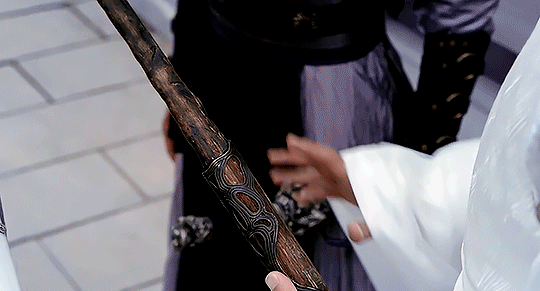
[ID: Gif from episode 19 of the untamed drama. Lan Wangji attempts to draw Suibian after he and Jiang Cheng storm the Nightless City and retrieve their swords. He cannot pull it from the sheathe. /end ID]
(in case anyone is curious, it’s about 30 minutes in. I spent the effort to make the gif, so I might as well give you the timestamp lol)
this scene takes place during the period of time when Wei Wuxian is in the Mass Graves (aka the Burial Mounds) after Wen Chao cast him down and left him for dead, right near the beginning of Sunshot. I’m fairly certain it’s not mentioned in either the novel or the audio drama, so this is a CQL-only detail. (please correct me if I’m wrong; I get my canons muddled all the time //hides face)
CQL basically does nothing narratively with this scene other than giving us some sad shots of Lan Wangji and Jiang Cheng (honestly, valid ;A;) but!! if we decide to accept this scene as our jumping off point, we can get to some interpretations about Wei Wuxian using information from the other canons!
take this exchange from chapter 57 of the novel (immediately prior to the massacre at lotus cove):
江澄道:“还不是又为咱们的剑的事去温家了。一想到我的三毒现在说不定被哪只温狗握在手里,真是……”
他面露嫌恶之色,魏无羡道:“可惜咱们的剑还不够灵,要是能自动封剑,那就谁也别想用了。”
江澄道:“你再修炼个八十年,说不定可以。”
Jiang Cheng said, “He’s gone to the Wen sect regarding our swords again, hasn’t he. Whenever I think that my Sandu might even now be in some Wen-dog’s hands, ugh…”
His face filled with loathing, Wei Wuxian said, “What a pity our swords don’t have enough spirit. If they could seal themselves, then no one could even think about using them.”
Jiang Cheng said, “If you kept cultivating for another eighty years, maybe.”
from the novel, it seems clear that sword-sealing is something that only happens when a person’s cultivation level is exceptionally high. if this is true, and we go with the CQL timeline of Suibian sealing itself long before Wei Wuxian’s death, it means that Wei Wuxian’s cultivation level wasn’t just high, it was leagues above pretty much anyone else when he was still a teenager. (In fact, Suibian had most likely already sealed by the time this conversation takes place.)
If we don’t go with CQL’s timeline, however, I think we could make a very different argument. It’s a bit of a reach, but I think it’s a lot of fun, if you’re willing to come with me on this journey!
Jin Guangyao says Suibian sealed itself “shortly after” Wei Wuxian’s death, but we don’t really have external confirmation of that. For all we know, someone only bothered to test it sometime after his death, and Suibian had been sealed for some indefinite amount of time. All we can say for sure is that by some point shortly after Wei Wuxian’s death, Suibian was already sealed and resisted being drawn by anyone who tried it.
We’re told over and over that one can only wield a spiritual sword effectively if you have a golden core/the spiritual energy to match it. Wei Wuxian stops carrying/using Suibian because he knows that in his hands, it will act as nothing more than an ordinary sword. His method of cultivation is no longer suitable for the sword. Suibian is tied to both Wei Wuxian’s soul and his golden core.
If sword-sealing only happens when the cultivator’s level is unbelievably high, then I think we can make the argument here that by the time of his death, Wei Wuxian’s core was likewise unbelievably strong – but Wei Wuxian is no longer the one developing his core. Jiang Cheng is.
I know it’s a ridiculous reach. To be clear, I don’t think the text actually intends this or supports this in any meaningful way, but I do think that it gives us some very tasty potential!! If Suibian sealed itself sometime after the core transfer (which, honestly, we wouldn’t know – after all, who’s been trying to draw Wei Wuxian’s sword?), but just if, I think we can plausibly make the argument that Jiang Cheng’s cultivation is truly extraordinary.
:DDDDDDDD
It’s fun right?? It’s a fun concept!!! Even if it’s nonsense, even if it’s not that deep, even if this was an unintentional coincidence, I think it would be interesting to look at this as being some kind of measure of Jiang Cheng’s accomplishments. On the flip side, I also think it’s very important thematically that Jiang Cheng’s value as a person has nothing to do with his cultivation, that he is, in fact, always second-best, but that doesn’t make him any less worthwhile or deserving of love. Maybe I’m just projecting lmao. Of course, being extraordinary doesn’t preclude him from still lagging behind Wei Wuxian–Wei Wuxian might have just been more extraordinary ahahah. We can have both!!
Now for a totally different thing! Interestingly, this conversation about cultivation levels and sword-sealing (the one with Jiang Cheng) also happens in the audio drama, S2E12 (about 15 minutes in, since I just checked), but Wei Wuxian adds an additional comment:
(don’t have the transcription of the original chinese, I’m just going to translate it as I hear it)
“But maybe you don’t need to cultivate to a certain level to have your sword seal itself. What if there were some other way?”
these two versions of the conversation actually imply pretty different things, I think! this addition opens the possibility to the audience that sword-sealing is possible even without an extraordinary level of cultivation, and I think lends credence to the idea that Suibian is just an unusually loyal sword, regardless of Wei Wuxian’s cultivation level. Whether that’s something inherent to Suibian’s “personality”, or whether this says something about how Wei Wuxian inspires loyalty wherever he goes, or whether it just speaks to the strength of their bond remains to be seen.
(obviously, this could imply any number of other things as well, but I find this to be the interpretation that makes me happiest.)
If we go with “Suibian seals itself after Wei Wuxian’s death” in this canon, I think this emphasizes the loyalty aspect with a touch of grief.
If we combine this with CQL and have “Suibian has been loyal since he was a teenager”, that also emphasizes the loyalty aspect – just in a different way.
Of course, doing meta combining unique details from different canons is largely pointless in terms of crafting any real “analysis”, so I’m mostly saying all of this because I enjoy the process of building the supercanon in my head that brings me the most joy! To summarize the varied interpretations I’ve brought up in this post:
CQL-only: Suibian sealed itself when Wei Wuxian was a teenager, at latest, by the time he was thrown into the Mass Graves.
Novel-only: Sword-sealing is very rare and achievable only through extraordinarily high cultivation. Shortly after Wei Wuxian’s death, Suibian is discovered to have sealed itself, so Wei Wuxian’s core, by the time of his death, was extraordinarily powerful.
Audio drama-only: Sword-sealing is considered very rare and achievable only through extraordinarily high cultivation, but might also be accomplished by other methods. Shortly after Wei Wuxian’s death, Suibian is discovered to have sealed itself. If Wei Wuxian’s core is not wildly and improbably powerful, this implies that Suibian has become an exceptionally loyal sword by the time of his death.
CQL/novel: Wei Wuxian was already incredibly powerful by the time he was a teenager.
CQL/audio drama: Suibian has been exceptionally loyal to Wei Wuxian since at least his teenage years.
Novel and audio drama-only have a much wider range of when Suibian could have sealed itself, as mentioned, so there are further variances within those interpretations.
there’s a lot of potential here!! with my personal feelings regarding the story, I like novel-only with Suibian sealing post-core transfer, audio drama-only with Suibian sealing post-Wei Wuxian’s death, or CQL/audio drama with Suibian sealing as a teenager pretty much all equally. I think the CQL/novel interpretation gets too close to casting Wei Wuxian as a hyper-special and innately noble individual in a way that undercuts the strength of his character arc, but that’s my opinion. (As an aside, this is actually one of my major complaints about CQL in general, independent from what I’m talking about here. But that is a topic for another day ahahaha. To be clear, I still love CQL very much, despite my many frustrations!)
As for what I think is the most “likely” to be the “right” interpretation (whatever that’s worth), I would probably say the one that emphasizes Suibian’s loyalty with Suibian sealing post-death, because I think it’s the most thematically cohesive and has the textual support to back it. (I think it’s a valid interpretation even using novel-only text; it’s just slightly less explicit without the additional comment from Wei Wuxian.)
A final detail:
We don’t get anything from either CQL or the novel that explicitly addresses when/if Wei Wuxian is able to wield Suibian again, but the audio drama’s rendition of the “Yunmeng” extra very subtly indicates that by the time that extra takes place, Wei Wuxian has cultivated a golden core and is carrying his sword once more. You only get it at a couple of moments, but Suibian sometimes clinks when Wei Wuxian moves or when he bumps into something. The two instances I can remember specifically are when Lan Wangji tosses the ring onto him (the ring hits Suibian), and when he’s rowing the little boat onto the lotus pond and the motion makes a sound. It’s!!! Extremely good!!! It makes my heart very full!!!!!
ANYWAYS, if all of my scattered rambling didn’t fill the Suibian-shaped hole in your heart, I would also like to recommend @zeldacw‘s wonderful WangQingSuiChen series of comics, featuring anthropomorphized versions of Wangji guqin, Chenqing, Suibian, and Bichen. I believe the most recent comic is here, and there are links to the rest of the comics in the post. If you just want her general tag for the AU (which is more than just the comics), it’s here!
If you have interest in listening to the audio drama yourself, you can purchase it through the MissEvan app (Mao’er FM). There are buying instructions linked in this post! If you need English subtitles, @suibiansubs is the group that does them. :)
I really can’t recommend the audio drama enough, tbh, it’s really really dear to my heart, and the team clearly worked so hard and cared so deeply for the story they were trying to tell. Consider this my regularly scheduled plug for the audio drama ahaha.
As always, my meta is my meta and if you don’t vibe with it, that’s chill! I change my opinions constantly (I think I changed them like three times in the course of writing this ahahaha), and I know some of my older meta has been making the rounds and every time I see it I think about all the ways my views have shifted since I wrote it rip. For this post moreso than usual, I want to emphasize that pretty much all of the meta included in this is meant to explore intriguing what-if possibilities, not for serious literary analysis purposes. I am aware that a lot of this is reaching/overinterpreting into implications that probably aren’t there. I just think they’re fun to consider!
so this was a mess, but I hope you or someone out there enjoyed it anon!!
(ko-fi, if you’re so moved)
#mdzs#the untamed#the untamed meta#mdzs meta#suibian#mo dao zu shi#mine#mymeta#asks and replies#Anonymous#oh dear GOD i did it again#past me: why this will be easy! I already know what i'll talk about! probably this will take an hour#present me: *stares into the camera like i'm on the office*#this post is a MESS#running my mouth at 100mph with zero coherent structure? more likely than you think#cyan gets too deep in the weeds#:/#meta#lmao idk if that matters#a window into my 24/7 stream of consciousness#filtered by tag: suibian#cries in a corner#im so tired whatever im punting this into the void#the structure in this is nonexistent and the language is weak please forgive me
936 notes
·
View notes
Text
Shikantaza Creativity Interview III - SPARTALIEN
At Shikantaza we are not content to just create art. We want to understand art. We want to understand the people who make art. Into the act of creation. Who are the people behind the art work? What motivates them? Where do they find their inspiration?
No two people think and act alike, so it is even less likely to find two artists who think and act alike. Yet, there will be crossovers, shared thoughts and shared experiences. Where do we adjoin and where do we diverge?
Our series of interviews with artists and creators aims to answer these questions.
In interview number three we speak to multimedia experimenter SPARTALIEN. You can find his creations here https://spartalien.com/visual as well as a collection of his work in the Shikantaza gallery.
1 - Starting with the most important question - Who is Memoria?
Memoria is Latin and means, when translated, memory / remembrance.
I named the merchandise for the album "2358" Memoria instead of Memory, because the main track titles are also translated into Latin.

I see my merchandise as small memories/artefacts. Not only because they are very rare, but because I can never go back to that time.
“Memory is the treasury and guardian of all things” - Cicero
2 - You work across different mediums. Do you have any preference for a specific form? When did you first find the format that was “you”?
I became really infected with the digital virus around in the late 90s when I built my first computer. A year or two later I started taking photos and manipulating them digitally. I also had a few printed, which allowed me to bring the digital into the real world. Then I discovered IRC and started learning a little bit of TCL. Since I had fun coding, I decided to learn the basics of web development because I needed a website to show my pictures to other people. In general, I was fascinated by the flow of information on the Internet. That distance is no longer a real hurdle when it comes to data transmission.
I've always loved music as a listener and small collector. I was then and still am one of those people who never go out of the house for long periods of time without a Walkman. Music production came into play when a couple of friends set up a small studio where they produced Techno/Psy. When I was there for the first time, I knew immediately that I wanted to try it too. A few old tracks from back then are still available on my website.
From then on, many of my projects have developed in the direction of music. The input for a program was often music metadata or it was a website that was about music in some way or another. But since I was still at the very beginning of my learning process, I kept discarding practically everything in order to improve it or to learn new things. Around 2001, I started a web radio with friends, which was online for several years. The music was mainly Downtempo, Trip-Hop, IDM and Ambient. Promos from unknown artists from around the world were also broadcasted.
The atmosphere, the feeling I got from this time - how the music finds me and not the other way around, how it can change people's thoughts - has never left me since then.
3 - Do you feel that each medium allows you to express yourself differently from the others? How do you choose which medium you work in any given moment?
Yes. But I think you can convey the same feelings with any medium. The question is how direct it is. For example, pain can be expressed with fire but also with a chair in an empty room. At the end of the day, in my opinion, it's not about the artist's intention but about the perception of the viewer and his or her subsequent thoughts and actions. For example, imagine you make a dark ambient track that you experience as sad and heavy, but someone else tells you that it helped to relax and develop thoughts.
In addition to all of this, each medium also has advantages and disadvantages when it comes to technical implementation. So, sometimes the choice can also purely depend on skill or resources.
We all have ideas and often out ambitions outweigh our resources. Sometimes we need more resources, but more often than not we need to chip away at our ideas until our ambitions and resources align.
4 - Do you seek different sources of inspiration for your music than you would for your visual creations?
It's everything in the world around me that inspires me. Everything I perceive and feel, so to speak. Most of the time I don't have a melody or a picture in my head. It is more of a feeling and then I look for the right tone or shape for it, so to speak.
5 - How closely are your creations connected to each other?
Very close one could say - through my thoughts that I have wrapped in it. I always had a bit of a problem putting my thoughts into words. I tend to stray through various topics when I talk about something. With music and visuals, it feels lighter and more natural to get to the point. The "message" doesn't always get through, but being able to do so is liberating and invaluable to me.
6 - If you were to direct people to a specific piece of work that you feel really nails what you are aiming for with your creations, which would it be?
This is a hard question. Maybe I would ask you to sit down and listen to the album "FLOATING HIGH" in one sitting. Since it felt like coming home to me while making it. The music is less intrusive and not as precise in its message as the previous releases. Like its cover art, where the clouds could be seen as opening or closing. I wanted to create tracks that leave more room for thought while still telling a story.

7 - You have “X minutes of peace” on your site. Why is this needed? Was this made for you or for others?
For others but also for myself. For me it is self-reflection that allows me to understand myself better. But since I have problems with "just switching off my head", the moments in which I just sit quietly and let the recording device do its work are very valuable. In moments like these I can really switch off and think about something very carefully. Asking questions even though I feel like I don't have an answer. Or simply enjoying the precious fresh air and sounds of nature.
Unfortunately, too many people don't have time for that kind of peace. Too much pressure is on them. They either get this or that, or they can't survive. It's so sad how the system works. I simply think that if everyone would have more inner-peace, the world would be a better place. But then again, what do I know living under a rock between mountains?
The videos should allow us to find peace for a few minutes, no matter where we are. So that new and hopefully useful thoughts can develop.
The series Let It All Go is actually the same thing, just with music.
For the really dark hours there is BRAIN I/O. From time to time I prefer to embrace the pressure. Difficult to describe. The concept is basically: don't think, just feel and record it. It's about things that I personally want to leave behind or at least want to learn to accept (not necessarily being okay with) them if I can't change them.
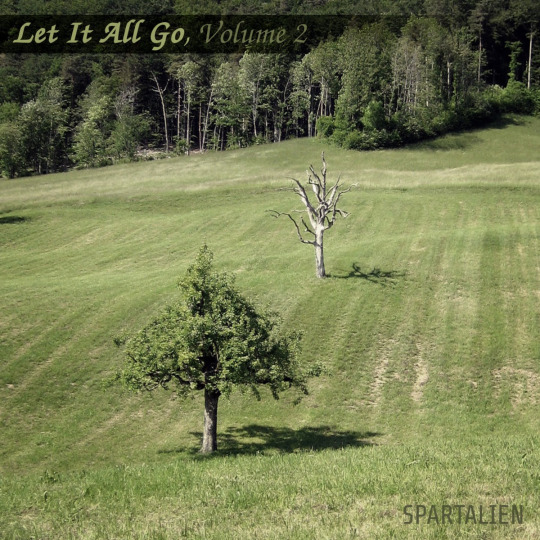
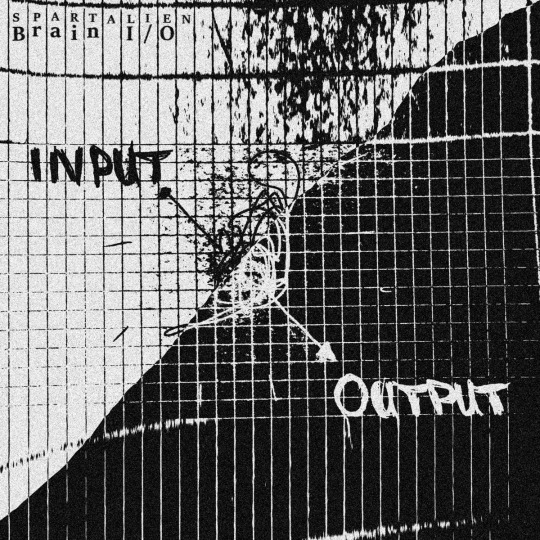
Peace is an issue for me. When I briefly find it only points the way to the next act. This is fantastic but self defeating. Why can’t we just stay in peace?
8 - When inspiration has left the building where do you look to find it?
I'm not really actively looking for inspiration. Somehow it doesn't work that way for me. So variety is important to me. That is why I usually have several side projects going on in the areas that I do not much publicize. Much of it never leaves my hard drive and is mainly intended to free my mind and get on to new ideas in the process. Coding, graphics, drawing, etc. But the music production is and remains the main focus.
9 - These are the questions I am asking all the interviewees. Why do you create? What is it that pushes you to keep creating?
The inner child is just too strong. I've been living for a while and I know exactly nothing. It kind of feels like that. So many things that you can create with the computer alone. I'm stuck in that loop where you just love to create things and learn - and use the new knowledge to create new things. Things!
10 - What would most assist you to create more works? Is there an ultimate goal for your creations?
More time and resources for sure. but most important to me is the feeling that my loved ones are safe. When I have to worry about their future because the system is going the way it is, it feels like a pile of stones in my head.
The creative / social goal of my art is relatively simple and based on my own experience. Art has helped me tremendously when I felt lost - or when I was just "bored". Taking time to really listen to or look at something can be very liberating.
My short-term financial goal is to generate a more or less regular income through art. But since I never released anything commercially before 2016, this world is still new to me.
My dream goal is to hear my music in film and games and to generate an income that supports my family.
Nonetheless, I think goals are here to create an initial path, not necessarily motivation.
I do not know of a single soul who has not been lost. Some never find their way back. Some don’t need to find their way back, they are happier in the place they found.
11 - If you were to offer a creator any advice what would it be?
Based on my own experience in no particular order:
Stay curious and open minded for different viewpoints.
Tutorials can limit your creativity. Sure, learn the basics, but explore as much as you can on your own and never be afraid to fail. It's a process, not a game.
On projects that take longer than a day to complete, set yourself a deadline when you want to have it completed. Not important if it takes longer, but in general that helps to stay more focused.
Very few things are easy when you start.
Limitations are not necessarily bad.
Don't wait for motivation to create. It will kick in usually a few minutes after you've started. Therefore keep your tools ready and organized so you can start creating at any time.
You can always turn off the internet.
Be open for constructive criticism.
Especially for the digital crowd, backup your stuff!
(All images and works by SPARTALIEN)
11 notes
·
View notes
Text
S4 Ep 39: Pharaoh Can Fly (Selectively)
Guys, they’re back
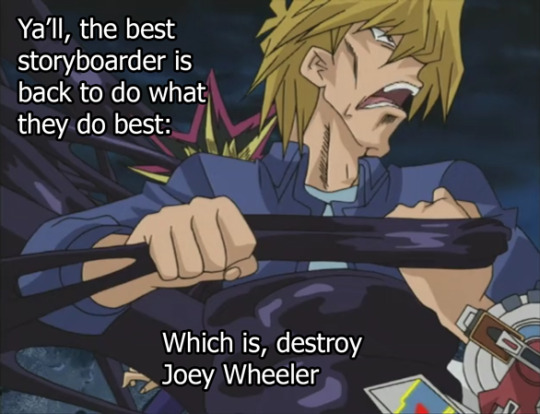
Best storyboarder is back, and the visual difference between last episode and this episode is like when your art teacher picks up your charcoal and just fixes everything wrong with your gesture drawings. It’s like...I mean look at this:
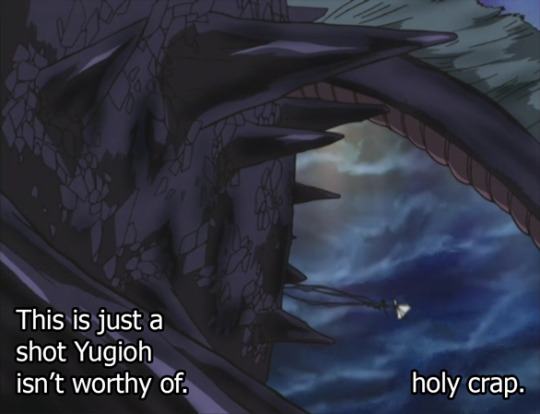
I just really love and appreciate how illustrative this storyboarder is. And I say just storyboarder because this had about the same budget as the last episode--there wasn’t that much actual animation as per usual. But, all of the scenes were drawn so well, like panels out of a good manga. They just...they always nail it when they’re at the helm and I don’t know why they’re on Yugioh, but bless this storyboarder.
Plot wise, everyone got pulled into the dragon by gooey tentacles that came out of it’s stomach, don’t think about it.
Meanwhile, all of the minibosses could communicate with them and beg for help, yes, even the same miniboss who may have dressed up like Pegasus and catfished Seto Kaiba.
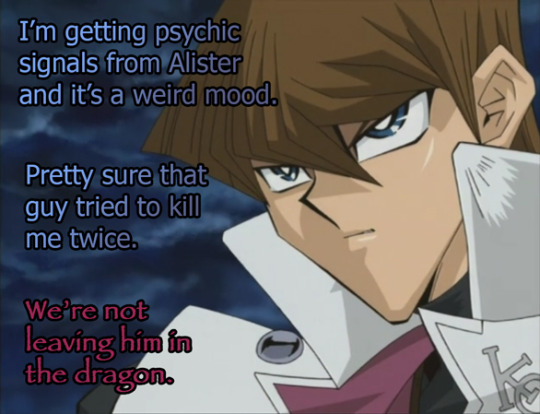
(keep reading under the cut)
The whole process of getting absorbed into the Orichalcos demon was a whole lot of symbolism and it was...kinda gross. Also kinda sketch. Also, for Kaiba it is a neat little nod to S1 when he had a vision that his brother was absorbed into a dragon mass.
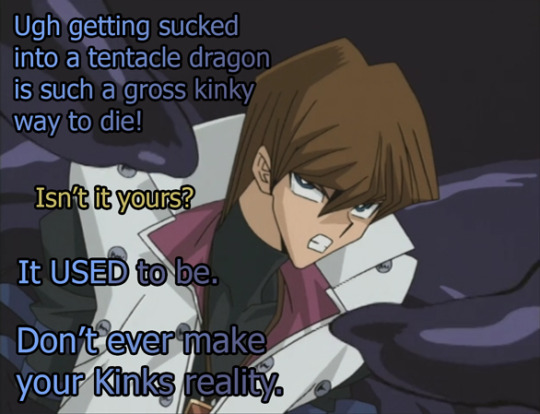
I don’t think that the makers of the show remember S1, but either they just really like goopy dragons, or it’s a coincidence or I dunno, on purpose? Probably a coincidence.
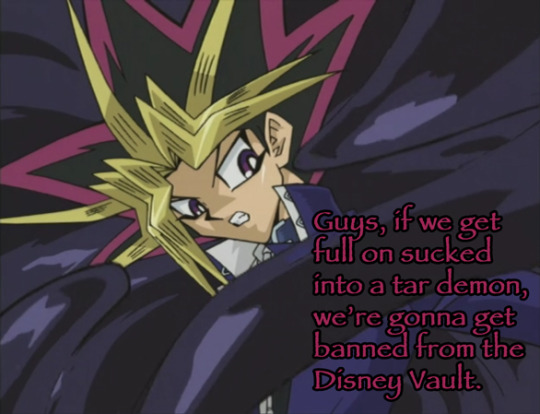
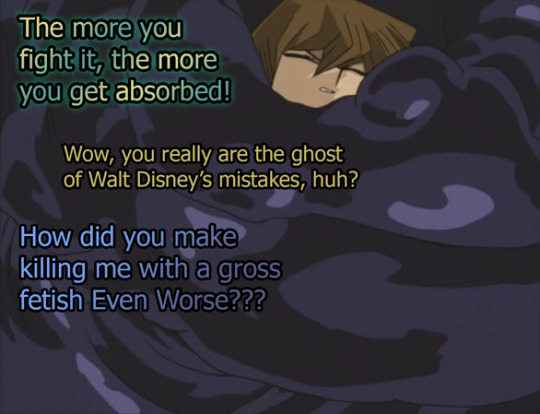
And like I made this joke and realized...what if they actually meant to make that parallel though? This is the America crossover season, and they have referenced America’s love of trickster rabbits before with Pegasus but do they know about Br’er rabbit in Japan? Do they know? It’s a pretty Americana Deep-cut, and I have no idea how common this folktale is outside of the states.
I see anime busting out absorbing goopy masses all the time so I’m gonna assume that there might be a Japanese folklore I don’t know about which uses a similar structure (although I’m also assuming it has an extremely different history and association ((which I won’t be going into because I don’t feel like putting a trigger warning on this recap)).)
And looking at Wikipedia, there’s people that think the original reference to moist, absorbing creatures could have even come from as far as India. Which is...fascinating to how it also developed in Africa, and then the Cherokee also made the same story independently and then it fused together here in the States to make it what was eventually made into a Disney movie that will never be released again--this is just a really old ass story, all in all, possibly like over a thousand years old.
And a FASCINATING google deep dive I won’t go into for obvious reasons but knock yourself out.
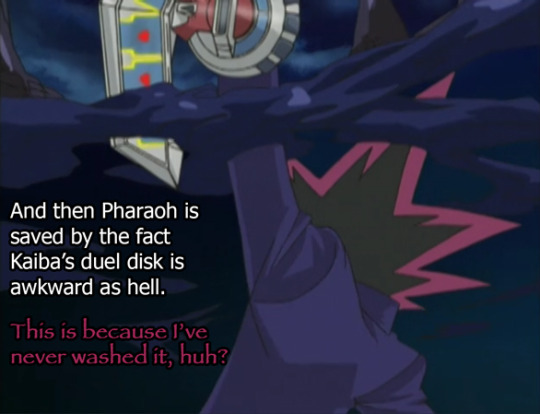
Also, lets get distracted for a sec and see how well this storyboarder drew a fitted jacket at that angle. Dear Lord, did they get reference for that or did their brain just already know that those folds would be there? You can even tell that Pharaoh has just a little bit of padding at his shoulders. Ugh. Guys this storyboarder is so freakin good at these little fitted jackets.
So, once Yugi and his friends are absorbed into the mass, where they should have died...and maybe some of them did, but I don’t know if I should add that to the Death Count because like...they could have held their breath in the amount of time they were stuck in there...maybe...Anyway, they are saved by being tossed into the figurative briar patch--by the souls all hanging out in the Leviathan’s stomach--which again makes me wonder...did they pull a folklore on us? Again, I have no idea.
Like a lot of the people in this dragon have been thorns in their side this entire season, they’ve all tried to kill them at one point--all the minibosses, Mai, Pegasus--but now they have decided to team up with Pharaoh (along with the rest of the human race) and offer whatever they can to free them from the grip of the gross dragon mass.
And like, the ending of the folk tale is that the thorny ass briar patch is also where the rabbit lives usually. It hurts everyone else, but the rabbit--the rabbit can deal with it. And likewise, Pharaoh is freakin dead. He’s at home here. He’s surrounded by spirit power, his friends and their friendship power, this is like his zone, and now he’s crazy powerful for it and will be for the rest of the episode.
And like Yami is a very trickster God (especially Season Zero Yami) so like...it does make sense that he would mirror a folk tale based on trickster Gods, even if it is by complete accident.
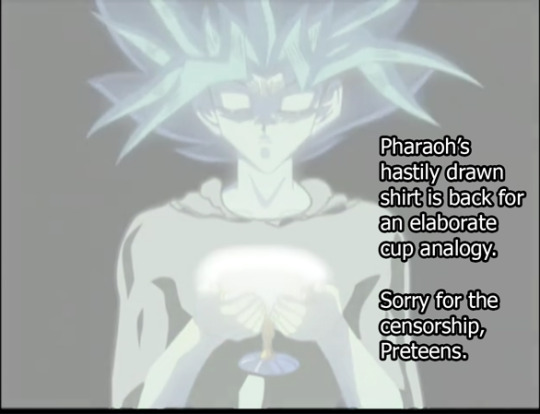
So Pharaoh imagines everyone’s tears as individual drops in a glass or something--it’s not a literal glass or anything--it’s just there because the only thing actually happening on screen was his hand hanging out of this dragon’s weird puss skin.
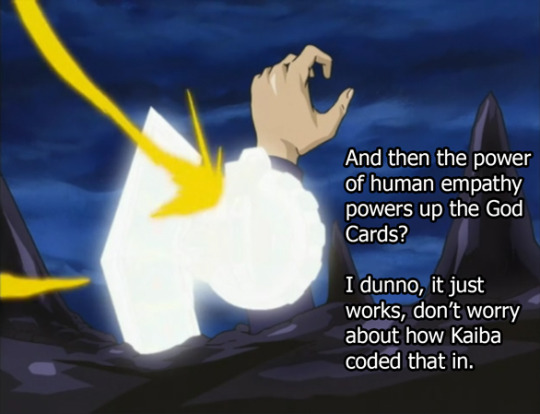
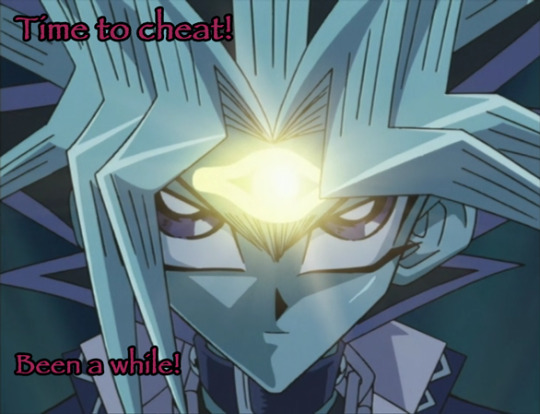
And he’s now a fully charged Sonic the Hedgehog and no longer needs Kaiba or Joey at all. Just gonna grab his God card demons and take charge of everything else from here on out.
By first exploding his buddies right the hell out of this lizard and across hundreds of feet of open ocean.

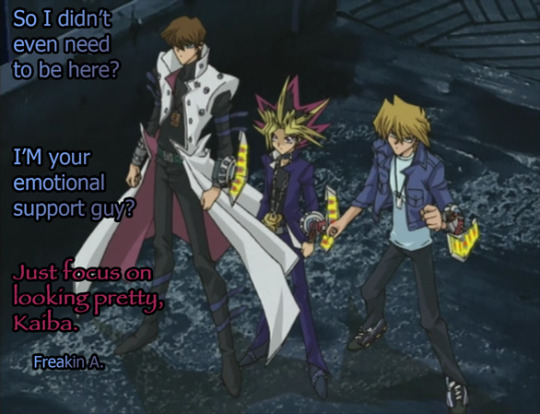
Joey decides to remind Kaiba that he lost the Battle City tournament.
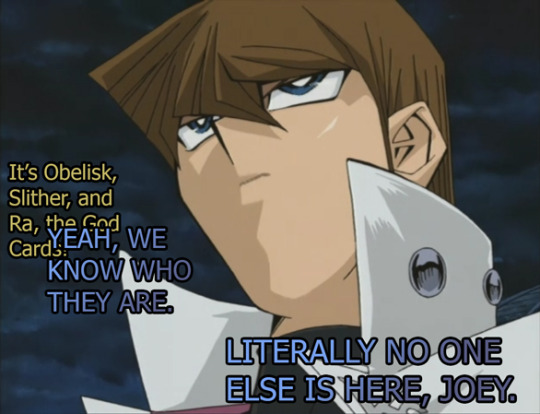
Seto’s roast was actually in the show, PS. He is not super excited to be reminded that Yugi owns every card that he spent 2 seasons failing to get.
And then Pharaoh did something really, really...
...just really really wild.
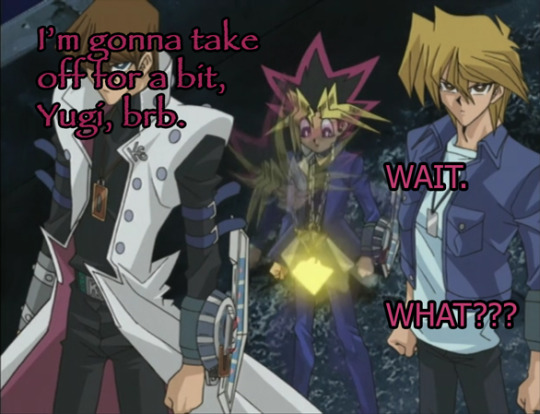
OH OK.
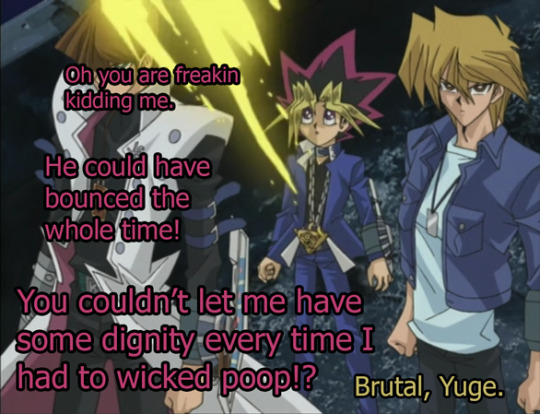
YEAH JUST TAKE OFF.
GO AHEAD THERE’S NO REASON THIS WOULD BOTHER ME.
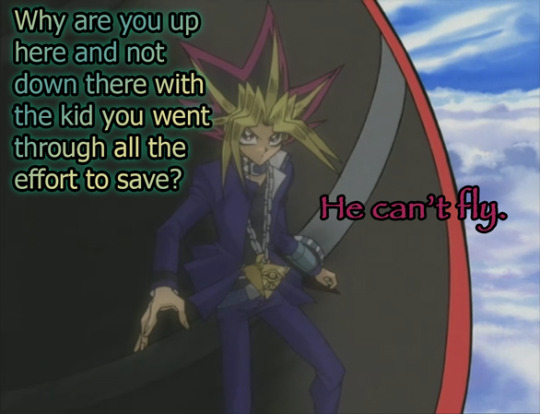
I mean he IS super powered right now but like...
Like...WTF?
4 SEASONS. 4 SEASONS I thought this guy was glued to Yugi like Peter Pan’s Shadow and apparently--he can bounce.
Can Pharaoh do this every time Yugi asks Tea out on a date and tries to instead make the ghost in his head do all the work now? Can Pharaoh just be like “NOPE” and then phase out of the house, leaving Yugi to actually do the hard stuff?
It really adds a level of complexity to their relationship if Yugi can get a room.
(If not a room for romance, but at the very least a room to poop in.)
OR has he been able to allow Yugi to wicked poop in peace this whole time, but the show just never felt like telling us because they felt like it wasn’t important (although it is crazy important)?

Either way I am just...floored at this character development.
Yami just let Yugi out of his sight for like...I want to say 8 full minutes. Just incredible amount of trust on Yami’s part. Incredible. Knowing Yugi’s track record, he should have died in those 8 minutes but...he was being babysat by both Kaiba and Joey.
So Yami summons the Gods and they shoot lasers--you kinda expect this sort of thing.
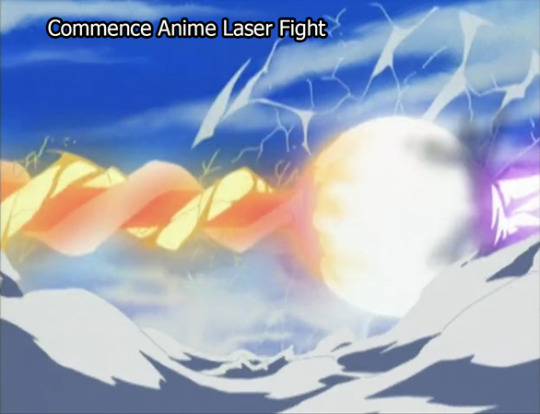
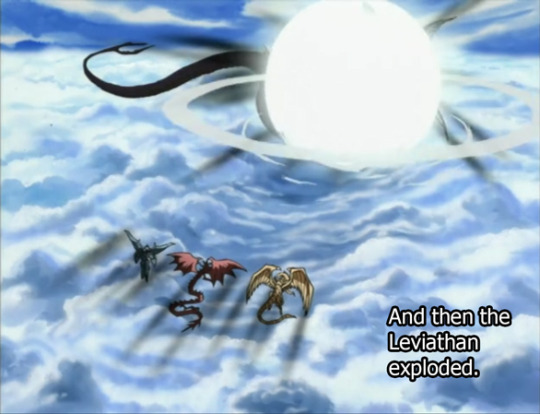
And this is...probably...the real reason why Dartz didn’t bother trying to attack Pharaoh 5,000 years ago.
I can still think it’s because of Bakura but like...this is probably the real reason. It felt pretty chump to just shoot a laser at the bastard. Pharaoh just had to be reminded that this is a thing he can just do. If he felt like it.
Which he never feels like doing, because he’s too busy watching Yugi’s every move, and getting distracted by High School shenanigans.
After this happens, the giant snake falls to the ocean, splitting into just sooooooo many ghosts.
Over 7.8 billion ghosts, if we’re to assume that this is most of the population on Earth.
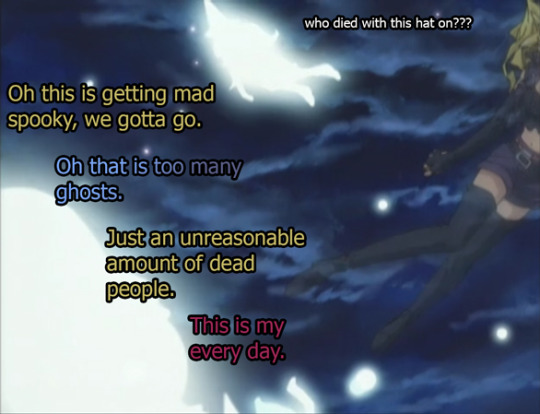
(thinking the weird-o in the hat is probably a Duel Monsters card? The duel monsters were throwing themselves into the Leviathan at one point so this is probably like a dark magician boy or something...I just don’t get very attached to the monster cards so it was like...whatever. The cards die like constantly so who cares?)
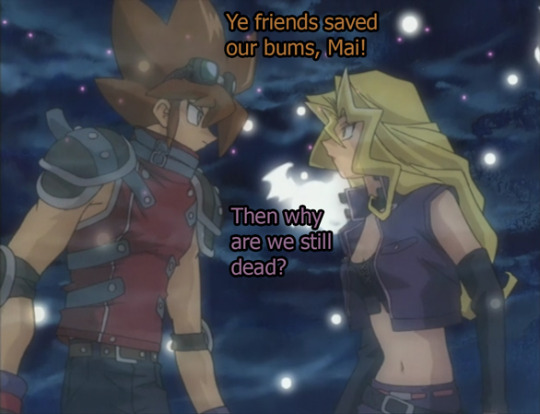
It is a pretty set dressing. Like Christmas lights but...dead people.
We also find out that the lost family of our minibosses Alister and Raphael, have indeed spent the last many years inside the Leviathan stomach, which is pretty tragic. We get a bitter sweet conclusion to Alister and Raphael’s story--although it’s not a full on ending for either character. Their life still hella sucks, they are in therapy for basically forever.
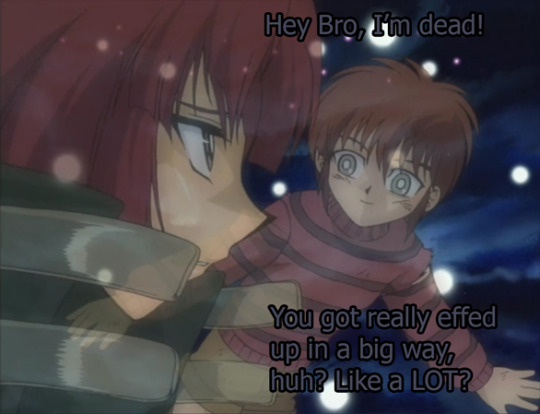
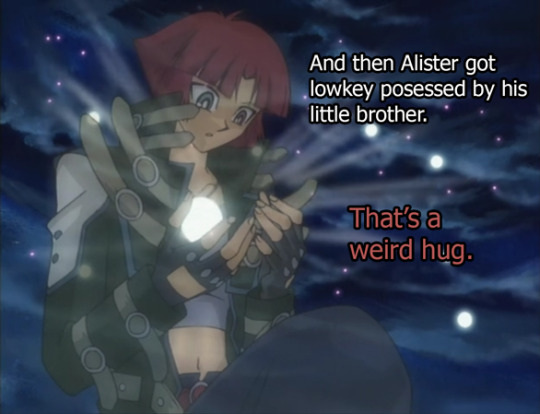
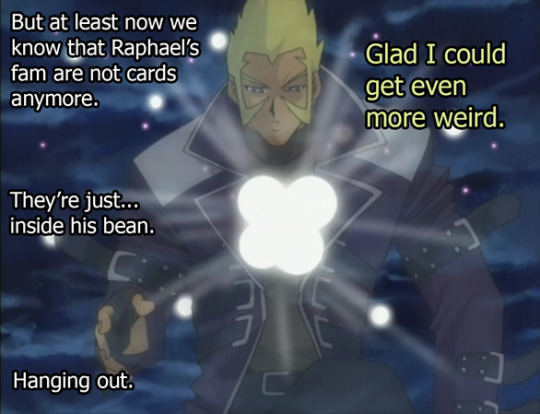
Where is Gurimo?
I don’t know what sort of job or life these two are qualified to have now, but youknow...Marik’s boat probably has jobs available.
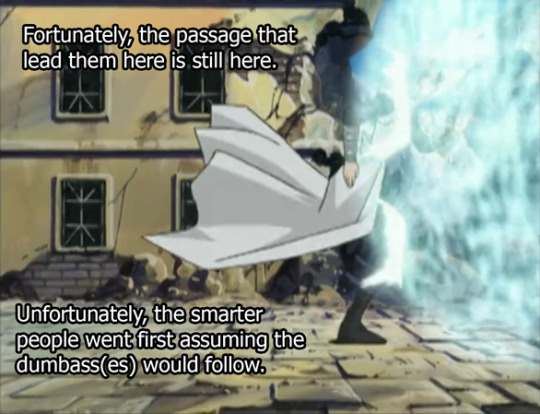
Hold up. Can we talk about the windows?
I know absolutely none of you care about this, but I do, not to be picky or condescending to an overworked art team, but because I just want to know what they were trying to aim for.
There’s an iron stained glass style windowpane thing going on and that’s what’s really getting me. Like...I know these guys were technologically advanced, but why did you use this WW2 background? What happened to Ancient Greece that you were doing before?
Like doing a super past with future tech is so cool to me--I love that sort of concept art. That’s going into like Black Panther stuff where you’re referencing the earliest stuff in Africa and then blending it with stuff beyond our science. But Atlantis is a real big shrug and a “listen we ran out of time and had to press print,” and it’s such a shame. It feels less cohesive than even when this show does Egypt.
And yo this show and how it draws ancient Egypt--I feel like I’ve already talked about that. I have a feeling I’m going to talk a lot more about it next season. I’ll get to it when we get to it. I’m hoping that they have more time and budget to actually DO Egypt for once. (I say knowing they won’t)
Like it’s one of those things where this isn’t a history show, like at all, and it’s very much a fantasy. I’m not going to be like those sewing people on youtube that get annoyed because their TV show doesn’t have handsewn stitching in their Victorian bodices they rented from the costume department from an LA discount warehouse. Because, yo, it’s TV, and I can stretch my own imagination because it’s acting. (although I confess, I watch every single one of those videos).
But...the potential, y’all...the potential.
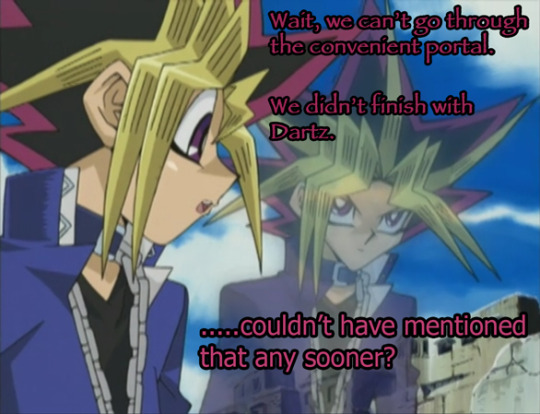
Anyway, Dartz isn’t dead. He was just taking his toot sweet time getting down the steps of his Gazebo.
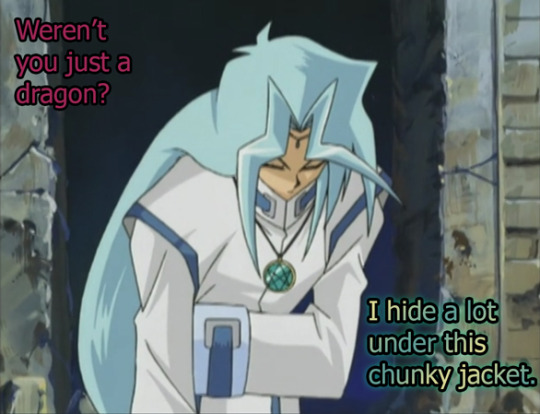
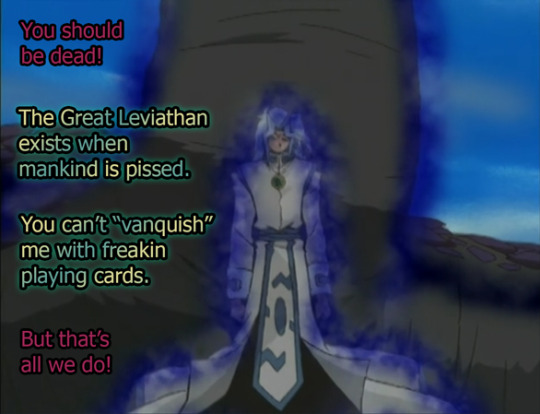
This is where things get very anime. I get this problem a lot with anime, I really do--and maybe it’s just me. But like...sometimes it feels like anime changes the rules during the boss fight.
That happens a lot, right? Where suddenly the final boss reveals something that like...should have been addressed way earlier? And he’s alive but you don’t get why?
Anyway, Pharaoh reacts by getting maybe way too attached to his newfound independence.

Which like...I can understand Tea forgetting that Yugi is one people that is two people all the time, but the writers as well?
And what’s kind of great about this scene is that Dartz does see Yugi as two people here. He doesn’t look at Yugi, he looks at both. When Pharaoh is like “Leave me, Yugi!” Dartz heard all of that.
Just kind of a neat thing that we finally have a dude that can just...see Pharaoh for what he is, but it probably won’t matter because there’s like only one more episode left of this season.
Anyway, Pharaoh and Dartz have a chat about where evil comes from...and like...it’s some Yugioh lore, all right.
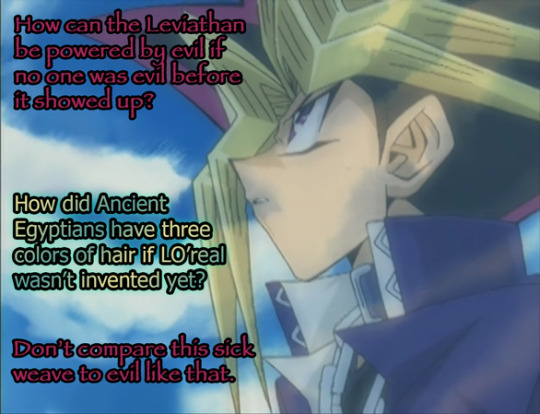
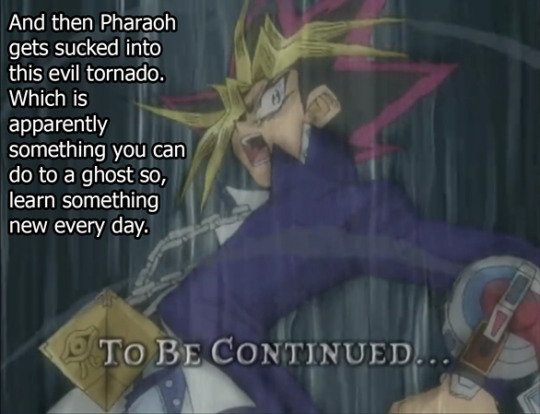
So before the show decides to give us the Genesis on Yugioh and reveal where the evil of the Orichalcos comes from, or if all evil was created by Orichalcos itself (which is IMPLYING stuff about Orichalcos) the snake shuts him the hell up.
As it should. Leave that Pandora’s box freakin closed. That’s going into extended universe of Star Wars books territory (RIP.)
As an aside--pretty sure that Yugi is standing outside that tornado. Maybe it was just the editing of the episode but like...
Yo I’m pretty sure Yugi is just standing there. For the first time, it’s not his nuts getting roasted. Wow. Tables have turned so much since he was dead.
Anyway, here’s the link for new people so you can read these in order
https://steve0discusses.tumblr.com/tagged/yugioh/chrono
There’s only one left! We can do it! We can finish this season in 2020! And actually get back to recapping Full Metal Alchemist! ~~Woooo~~
Oh man that movie better still be on Netflix or I’ll have to buy it lolol.
#Yugioh#ygo#Yu-Gi-Oh#Yami Yugi#Yugi Muto#Seto Kaiba#Joey Wheeler#Dartz#Alister#Raphael#Valon#Mai Valentine#My favorite storyboarder#who deserves to be listed as a character in the show#ep 39#S4#recap#photo recap#episode recap
37 notes
·
View notes
Text
Oh So Many Years: Ch. 9 - Just A Little Bit
Pairing: Hermione Granger x Fred Weasley
Summary:
With Hermione and Harry's friendship mended, and her bond with the twins, strengthening, Hermione finds herself looking up. The only thing left to do is fix Ron's attitude and keep herself from throttling Rita Skeeter the next time she sees her.
Fred and George have found relief in both Hermione's help and her friendship. Unfortunately, as a result they've been neglecting their other friends and someone isn't too shy to point it out to them.
Warnings: Swearing, Death, Smut/18+ NSFW
Author’s Note:
I update every week before midnight on Sundays (US MST)! Please feel free to like, comment, and reblog! xoxo
Masterlist
<< Chapter 8
Oh, no
I'm not the one, oh, you can ignore
I'm not like those you had before
Oh, hell no
“It’s just absolutely ridiculous, right?”
“Are you still on about that?” George asked, his tone laced with practiced boredom as he laid on his back in front of the fire in the Gryffindor common room. He had somehow come into possession of a quaffle and was repeatedly tossing it in the air and catching it, occasionally passing it to Fred when the mood struck.
“Yes, I am still on about it! How anyone could read this garbage and believe it, I will never know.” Hermione threw the quill she’d been writing with onto the desk, ink blotting across her parchment, and picked up the Daily Prophet once again. An avid reader of the wizarding newspaper, Hermione never gave much thought as to whether the stories of journalist Rita Skeeter were true or not. However, as she stared at the words printed across the page for the hundredth time, she questioned whether the woman had ever written anything factual in her life. Harry had told her about the disastrous interview the night before – Rita Skeeter’s devious smile, the basic lack of attention, her casual yet inappropriate flirtations, and her Quick Note’s Quill scribbling away all the while. Therefore, it hadn’t surprised her when the article portrayed a weepy yet confidently disillusioned Harry Potter pouring his soul out and then boasting on his magical prowess. What did surprise her, though, were the last few sentences.
“…Harry Potter’s close friend, Collin Creevey, has informed us that the young Triwizard participant can regularly be found in the company of a Miss Hermione Granger – a pretty muggle born fourth year. While officially their relationship has not been confirmed, it’s hard to deny the tell-tale signs of young love,” Hermione read, her voice raising to a shout by the end. Folding the paper, she threw it aside once more, this time as far out of her reach as humanly possible. Whirling through the air, the heavy paper made contact with an unsuspecting first year walking by. Hermione winced and gave the boy an embarrassed apology before picking up her wand and cleaning the ink from her assignment. She looked at the contents of her notes thus far and huffed. The words blurred together, her anger resulting in an altogether apathetic state for anything that wasn’t the infuriating article. Turning her head, she glared at Collin Creevey from across the room as he sat in the corner with his brother and a few other younger Gryffindors. They chatted away, playing the perfect role of innocence.
“Hermione—” Harry gave her a pleading look “—could you please just let it go?” He placed a hand gently on her forearm. At that moment, two third year girls walking past, spotted the placement of his hand, and hurried past, whispering and giggling to each other. Harry removed his hand quickly, grimacing. Hermione sighed, taking a moment to think about how this affected not just herself but Harry as well. Whispers and pointing she could deal with but lies were intolerable. It was just so…immoral! However, she imagined all Harry wanted was for all of this to disappear, to forget about it, and to be able to go back to some form of normalcy. She leaned back in her chair. If she could do anything for him at that moment, it would be to do as he asked.
“Alright, I’ll let it go. But don’t think I won’t give this Skeeter woman a piece of my mind when I finally meet her.” She sat forward and began writing out her study guide for transfiguration again.
“I wouldn’t expect anything less,” Harry said in amusement, before turning back to his own work.
Unlike George, Harry and Hermione sat at a table adjacent to the fire accompanied by Fred. Harry was working on an extra paper given to him by Professor Snape after his abysmal duel with Malfoy. Hermione was working on transfiguration, and Fred on his latest product. It was another sweet, similar to their Ton-Tongue Toffee, but ultimately very different. Earlier that night at dinner, Fred and George had ran into the Great Hall flushed with excitement. They pulled her away from the Gryffindor table and into the adjoining corridor, ignoring Hermione’s questions and feeble attempts to pull her wrist from Fred’s grasp. Once out of earshot from their curious peers, they began to bombard her with their latest and greatest idea – Canary Creams. Fred insisted that the idea would be hilarious, a sweet that when eaten, turned the person into a giant canary bird.
Silently, Fred slid his notebook on top of Hermione’s work and pointed to a list of possible wand movements and an incantation to charm the sweets. It really was a tricky thing when you thought about it. Sure, some sweets were already available that caused physical changes to their consumer, but none that she knew performed full form transfiguration. Pairing transfiguration, charms work, and potions was no easy feat. To successfully develop a Canary Cream, they had to produce a lasting charm that utilized transfiguration elements to result in a temporary transformation of the whole body from human to aviary. It was, to put it lightly, difficult.
George had helped early on with the charms aspect of the spell, but now they needed Hermione’s help with the transfiguration part – a subject, lucky for them, she was well versed in. Closely, she surveyed the work and found herself quite impressed. The incantation seemed to be correct and the wand movements as well, except there was just something about them that was…off. Mentally, she visualized the movements and when it finally came to the last movement, she realized the mistake. Dipping her quill into her ink, she crossed off the last tap and replaced it with a flick and then a tap, before sliding the notebook back to him. Fred shook his long ginger hair from his face and assessed the changes she made as Hermione returned to her own work. Looking down at her papers, she tried to find where she left off.
“What’s this for?” Fred whispered. Turning towards him, Hermione was caught off guard to find the boy so close, leaning towards her and pointing at her correction.
Blinking a few times, she answered, “You do want them to be human sized canaries, correct?”
Fred stared at her for a moment, and then back down at the paper before smiling. “Yeah, I suppose we do. I knew there was a reason we asked you to help.”
“If I remember correctly, I volunteered. Should I be regretting that?” Hermione teased.
“Don’t you dare Granger,” responded Fred with a wink. Heat pooled on Hermione’s face and she nervously grinned back, unsure of what to say. Fred spoke again, “Are you sure it will only be temporary?”
“What are you guys working on?” Harry asked. Hermione jumped, pulling back from Fred and the notebook they’d been piled over.
“N-nothing! I’m just helping Fred with his studies. He’s struggling in quite a few of his subjects, so he asked me to tutor him,” she lied. “Isn’t that right Fred?” She turned to him with a sweet smile.
Fred glared back at her, but ultimately cleared his throat and looked to Harry before speaking, “Yeah, I asked Granger to help me. But don’t worry Harry. It’s strictly professional. Wouldn’t want you to think I was trying to steal your girlfriend from you.” He ended his sentence with a cheeky grin. Hermione responded the only way she knew how – by kicking him in the shin under the table.
“Ow!” Fred reached under the table, and rubbing his leg. “Did you just kick me, Granger?” he asked, his long hair falling into his eyes.
“Yes, and you very well deserved it.”
Fred looked to Harry for support but only met his grinning face and a shrug of his shoulders. He then looked to his twin, still lounging on the floor but much more interested in the conversation.
“Don’t look at me, I think you always deserve a good kick in the shin,” said George, chucking the quaffle to his brother. Fred caught it easily.
“Some good friends you are,” Fred grumbled throwing the quaffle back to George before they all let out a few good-humored chuckles.
“I’d say they’re better friends to you than they are to me.” The voice took them by surprise. Looking to the portrait entrance, Hermione saw Ron, having just entered the common room to find the four enjoying themselves without him.
“Do you have a problem, mate?” Harry asked, his voice stony.
“I’m not your mate,” Ron responded, a touch on the dramatic side in Hermione’s opinion.
“Well if you’re not my mate then I guess you can just piss off. Yeah?” added Harry lightly, turning back to his work. Hermione looked between the two, feeling incredibly uncomfortable and unsure of what to do. Ron gave her a nasty glare before turning to his brothers.
“You two can’t possibly believe him, can you?”
“Yeah, we do,” Fred and George answered in unison. George sat up properly, tucking the quaffle under his arm.
“He may be the Boy Who Lived—” started George.
“—but he’s not nearly bright enough to put his name into the goblet,” Fred finished.
“Sorry mate!” the two called over to Harry who merely shrugged, finding no offense in the statement.
“What happened to family loyalty?” Ron asked his older brothers, a hurt expression on his face.
“I think there’s a ‘being a complete prat’ contingency to that concept, brother. Besides, Harry’s family too.” George stood and stretched before tossing the quaffle at Ron, who caught it unenthusiastically.
Ron turned to Hermione now. “Guess I know why you always take Harry’s side. Thought you two would at least have the decency to let me in on the secret. But I guess there’s a lot of things you don’t tell me.”
Hermione opened her mouth to argue, but before she could get a word out Ron continued, “Doesn’t matter though, everyone else agrees with me anyways.” With a final glare, he turned and headed towards the boys’ dormitories, ridding himself of the quaffle on the way.
The common room was silent after Ron’s departure. Hermione realized that everyone had stopped to listen in on the dramatic scene. She really wished they hadn’t. One look at Harry and she knew he was wishing the same thing. His shoulders were hitched all the way up to his ears and his face was unnecessarily close to his parchment. The quiet weighed on Hermione like a thick and heavy blanket. She returned to her work, but the more she stared at the pages of her book, the more uncomfortable she became. Every fiber of her being wanted to storm up those stairs and give Ronald a piece of her mind, but she was worried she didn’t have the strength. Then something Fred had said to her in the hospital wing rang clearly in her mind, giving her the strength, she needed: …there’s nothing for you to be afraid of. You’re more badass than I could ever be.
She rose, pushing back her chair. Harry, Fred, and George looked at her.
“If you’ll please excuse me,” she said politely, turning on her heel and heading towards the stairs that led up to the boys’ dormitories. She had only been in Harry and Ron’s room twice before, but she still knew the way. She climbed the spiral stairs in a fury, having no idea what she was about to say, but knowing she needed to say something. Her period of silence with Ronald Weasley had to end. Coming to the dormitory door, she pushed it open, not even bother to knock as anger and determination fueled her actions.
“Bloody hell Hermione!” Ron exclaimed, covering his bare chest. He was standing in the middle of the room clad only in his pants, trousers and shirt strewn aside in a pile, as he uncomfortably shifted. His face and chest were red as a cherry tomato, flushed in embarrassment, but he glared at her all the same. Hermione coughed, caught off guard by his state of undress. She had never seen Ron without his shirt, let alone his trousers. Trying not to focus on the freckles that spattered his chest, the flush that now covered her face, or the strange tug in the pit of her stomach, she pushed past the awkwardness of the situation and continued on with what she originally intended to do. Looking to her left she noticed Neville was also present in the room, confused and uncomfortable. She smiled sweetly at him.
“Neville, would you please excuse Ronald and I for a few minutes?”
The pudgy blonde boy nodded quickly and jumped from his bed, fleeing the room in a full run.
“Hermione, what are you doing in my room?!” Ron asked in a yell.
Hermione took a deep breath. “I’ve come to make peace. To have a heart-to-heart as they say…” Casually but with purpose she strolled further into the room, past Ron, to sit on the edge of his bed.
“Now? While I’m sodding naked?”
Hermione rolled her eyes, starting to feel normalcy return at Ron’s thickness. “Well put some clothes on if it’s so important to you, but yes, now.”
Ron stared at her, frozen where he stood. When he failed to move, she raised her eyebrows and tilted her head insistently, urging him to hurry up. Ron scurried to his trunk and pulled on a pair of striped bottoms and a vibrant orange Chudley Cannon’s shirt, before plodding over to sit next to her on the bed. He pulled his knees up to his chest and wrapped his arms around his legs, closing himself off to her and the world around him.
“What?” Ron stubbornly asked, avoiding her gaze.
“I think I deserve an apology from you,” said Hermione bluntly.
Ron looked up at her in surprise. “I need to apologize to you?!”
“Yes. You do—” Hermione stayed strong, squaring her shoulders “—Ronald, we have been friends for nearly four years. More importantly you and Harry have been best friends for just as long. Have we once ever lied to you? Deceived you? Betrayed you? Not supported you?”
Ron didn’t answer. Instead he looked down, resting his forehead against his knees.
“No, we haven’t—" she went on “—Now I don’t know what’s exactly been said or not said between you and Harry, and it’s not really my business. All I know is that when you accuse me of not being a good friend to you, it hurts. I’ve done my best to try to support you and Harry as I see fit. And that support involves believing and trusting you both when you tell me something. So, when Harry tells me he didn’t put his name in the goblet…I believe him. Because he’s my friend and until he does something to make me not trust him, I will continue to trust him. I’m not ‘siding’ with him to spite you and honestly this whole story you’ve concocted, that we’re conspiring against you, makes you sound like an absolute loon.” Hermione finished her speech and tucked her own legs up to her chest, hoping Ronald would respond to what she said with reason. When he didn’t automatically bite her head off or demand she leave his room, she let out a deep breath of relief.
She watched as Ron’s mouth scrunched up in conflict, his long hair covering his eyes and most of his emotion, until finally, he spoke, “I know you two aren’t plotting against me.”
Hermione looked at him in confusion.
“Well I mean, I guess at first I thought you were, but now not really. It’s just not fair. No one likes to be second, especially to Harry Potter. Harry Potter’s stupid friend…”
Hermione’s heart broke. She unwrapped herself and scooted sideways, pulling Ronald into a tight hug. He stiffened at the contact for a moment and then relaxed. They had never been physically close, the way she and Harry were, but Hermione felt this situation called for it.
“You’re not Harry Potter’s stupid friend, Ronald. You may not see it, but you’re worth a lot more than you realize. Are you a bit lazy when it comes to schoolwork? Sure—” they chuckled at her comment “—but you are not stupid.”
She pulled back, looking into Ron’s eyes for the first time in weeks. “You know, I think if he could, Harry would switch places with you in a second. Fame isn’t always a good thing.”
Ron nodded and wrapped an arm around her shoulders, pulling her into his side. Hermione rested her head on his shoulder and felt the heavy weight of Ron’s head atop hers.
“I’m sorry Hermione,” he mumbled sincerely, slightly begrudgingly, but sincerely, nonetheless. Hermione smiled. Despite his bullheaded nature and obnoxious tendencies, Ron really did have a big heart. She was warmly reminded for a brief moment why, despite all his character flaws, she possessed an affection for him.
“So, how are you going to make things up with Harry?” She perked up, breaking the nice serenity of their resolution with their next challenge. Ron sighed in frustration.
“I don’t know,” Ron said, dropping his arm off her and rubbing his face.
Hermione hopped off the bed. “Well, do it on your own time, I suppose, but try not to take too long. Harry’s going to need the both of us this year.”
Ron stood as well and walked her to the door, nodding in agreement. Hermione pulled the door open and turned, looking over Ron’s kind face. A moment of impulse and Lavender’s nagging words to make a lasting impression took over and before she knew it, she was lifting onto her tip toes and placing a quick peck on Ron’s cheek. She watched as Ron brought a hand up to where her lips had touched, his cheeks turning a shade of pink under his fingertips. Throats cleared from behind her and Hermione turned, finding the twins standing in the stairwell, arms crossed and smirking. They had obviously been snooping.
“Goodnight Ronald,” said Hermione quickly, closing the door in his face and turning towards the twins in annoyance.
“Is this the young love Skeeter was talking about then?” asked George amusedly.
Hermione rolled her eyes, answering in irritation, “Get an earful then?”
“Nah, couldn’t really hear through the door,” George admitted in disappointment.
“Too thick,” added Fred.
“You know, we really should invent something for that,” mused George, looking to his brother.
“I’ll start whipping up the schematics tonight,” bit Hermione sarcastically as she pushed past them and headed down the stairs. She found Harry right where she left him and sat back down in her seat. Neither said anything as she picked up her quill and got back to work. They sat there for quite some time until Harry finally broke the silence. She wasn’t sure how late it was, but the fire was beginning to burn low and they were the only two left in the common room.
“I got a letter from Padfoot last week,” he informed her. Hermione perked up at the news, hoping that something good would come from Harry’s godfather.
“What did he say?” she asked, setting down her quill and rearranging her notes.
“Not much—” Harry ran a hand through his unruly hair “—he wants to talk on the twenty-second. Guess he doesn’t trust sending letters anymore.”
Sirius Black, also affectionately known as Padfoot, had great reason to be untrusting of the mail as he was currently still on the run from the Ministry of Magic. Accused of a crime he did not commit, it was barely a year ago he used his Animagus form to break out of Azkaban, the wizarding prison. Then through a series of incredibly complicated and confusing events (some of which included time travel), she and Harry helped him make his overall escape on the back of a hippogriff.
“Talk? How are you going to talk?” Hermione asked, placing her things into her book bag. Surely Sirius wasn’t planning on coming onto the school grounds. With ministry officials scurrying around for the tournament, Hogwarts was a risky place to be. The whole country of England wasn’t a safe place for him really.
“I don’t know. He just said to be in the common room at one in the morning,” admitted Harry as he collected his things as well. Hermione frowned.
“Well I just hope he doesn’t plan on putting himself in danger of getting caught or seen,” she said, looking purposefully at her best friend.
“I just hope he has some advice on how to not die this year in the tournament,” said Harry. Hermione bit her lip and something tugged sharply in her chest. She reached across the table and placed a hand atop Harry’s.
“Harry James Potter, you are not going to die. Not if I have anything to say about it,” Hermione proclaimed the fact with so much conviction, she surprised even herself. Harry looked at her though his round glasses, his green eyes scanning her face. For what? Sincerity? Truth? Answers? Hermione did not know, but what she did know was that she wasn’t going to let Harry down. Her breakthrough with Ronald was only the first step. He placed his other hand over hers and gave her a tight smile. Hermione blinked rapidly, fighting the tears that threatened to spill down her face. After a moment they stood and left the common room to their respective dormitories. Not another word was needed.
Fred sat at the Gryffindor table in the Great Hall eating his lunch. He thought there must have been some greater power looking out for him today because they were serving his favorite – shepherd’s pie. The day had been a rough one so far and the little comfort that came from his favorite food was enough to take the edge off. That morning, after another futile attempt to catch a visiting Ludo Bagman, he and George had gone over their inventory and funds. Needless to say, it was depressing. Turns out they needed the money Ludo owed them more than they thought. They were for all intents and purposes, broke. The advertisement they sent out for had profited quite well, but with their mother’s raid before the start of term, their supply was limited and soon they would no longer be able to supply products to keep up with demand. He and George wagered they could make a larger profit off of new and exciting products, but they really only had a few sickles and knuts for pocket money. The whole situation left them with one option.
“Harry—" Fred spoke, catching the attention of the dark-haired fourth year “—mind being a dear and letting Georgie and me borrow Hedwig?” He watched as Harry swallowed his sip of pumpkin juice and wipe his mouth with the back of his sleeve.
“Uh, sure. What for?”
“That my dear boy—” smirked George “—is classified.”
“Really on a need to know basis,” Fred added, sniffing importantly.
“You know, I think I’d rather not know actually. But sure, she’s up in the owlery. Just make sure you bring her a treat, or she’ll be put out for a while and I’ll have to pay the price,” Harry informed them before stuffing a forkful of mashed potatoes in his mouth. It was at that moment Fred spotted a flushed and chipper Hermione entering the Great Hall. Her hair was especially full and bouncy as she skipped towards them, her cheeks and nose a soft pink hue. Fred imagined she would be in a better mood today after what he could only imagine was a reconciliation between her and Ron last night.
“Good afternoon,” she greeted the lot of them cheerfully, setting her bag down and sitting next to Harry.
“What’s got you all pink? Just come from a hot snogging session?” George asked cheekily. Hermione’s face transitioned from its soft pink to a brilliant red. Lifting her nose up in indignation, she trained a disapproving look on George.
“If you must know, I’ve just come from Hagrid’s—” she loaded the plate in front of her with shepherd’s pie and vegetables “—he had me over for tea, and so naturally I’m starving.”
Harry snorted, shooting pumpkin juice across the table. Fred cried in despair as the last of his lunch became covered in regurgitated liquid.
“Gross mate,” said George, scrunching up his face as he wiped his wet cheek with his robes.
“Sorry,” coughed Harry sheepishly.
“Did you see the new notice on the bulletin board this morning?” asked Hermione. They all shook their heads. She rolled her eyes, obviously annoyed they didn’t keep rigorously up to date with the daily affairs of the school like she did. Fred watched hypnotically as Hermione tucked her hair behind her ear and took a bite of her food. He concentrated on the odd way her nose scrunched ever so slight when she chewed, almost like she was intrigued by the taste alone. Hermione had a very small nose. Not in a disproportionate way, but in a very pleasing way, he decided. Thin across the bridge, it’s up-turned end pointed ever so delicately into the air. It was also spattered with freckles, much like his own but not quite as obvious. From far away you’d never see them, but as you got closer, you’d notice the light patterns of golden brown that adorned the bridge spreading under her eyes.
“Earth to Freddie!” George bellowed in Fred’s ear.
Fred jumped, covering his assaulted ear drum. “What?!”
“I was saying they just put out the announcement that next weekend is a Hogsmeade weekend. I thought maybe we could all go!” Hermione proposed for the second time.
“Or do you prefer to sit and stare at Hermione all day like a twat?” George asked.
Fred frowned at his brother. “I wasn’t staring. I was simply lamenting over the fact that I have to buy Granger a week’s supply of sugar quills.” Luckily, they were a very cheap sweet, thought Fred.
Hermione smiled sweetly, but Fred caught the devilish glint in her eye he was becoming very familiar with.
“I don’t know Hermione—” said Harry “—you might have to go without me.”
“Why?” she asked, her face falling. Fred watched Harry lean in and whisper something to Hermione. She pulled back and nodded, her face a mask of concern and understanding. Leaning back in, it was her turn to whisper something to him – information that he and George were not privy to. Her small hand reached up from under the table and landed on Harry’s upper arm as they pulled back smiling. Obviously, they had come to some kind of agreement that both were happy with. Fred felt an odd sensation wash over him as he watched the two engage in their private conversation. It was the same feeling he got in the hospital wing with Angelina and again when he watched Hermione kiss his little brother on the cheek.
If he didn’t know any better, watching this interaction, he might have believed Rita Skeeter’s accusation that her and Harry were entangled. He shook his head, clearing his mind of the strange route his thoughts had taken. Glancing down the table his little sister, Ginny, was sat next to Neville Longbottom and a few of her friends, laughing and gossiping as they ate. Just past them sat a group of first years looking over a copy of Seeker Weekly, and then further down were Lee, Alicia, Katie, and Angelina. The first three seemed to be engaged in an excited conversation. Lee was lecturing Katie on something with a tired look on his face while Katie shook her head and brought a hand up to her brow. Alicia watched the two, grinning as she stifled a laugh. But the last, Angelina, was looking at him. As their eyes connected, he gave a small friendly smile. However, he was not greeted with a smile in return like he expected. Instead she stood abruptly from the table and headed towards the exit to the Great Hall.
Fred stood too. “I’ll catch you later Georgie. Gotta’ go take care of something.”
He didn’t wait for a response as he raced out of the Great Hall to catch up with Angelina. He found her not too far down the corridor.
“Angelina! Hey, wait up!” called Fred, jogging towards her. Angelina stopped and turned, waiting for him to close the distance between them. From her crossed arms and scowl, Fred could tell she was upset. “What’s the matter? What’s wrong?” he asked, placing a hand on her cheek.
She brushed him off. “Nothing,” responded Angelina, pushing her dark braids over one shoulder, and looking away from him. However, Fred could tell from the tone in her voice that there was in fact, something wrong.
“Come on. Don’t lie to me Angie. You can tell me. What’s wrong?” implored Fred as he reached out his hand again and pulled her face towards his, coaxing her to look at him.
“Oh, now you’re here for me? How nice of you to actually pay me the time of day,” bit the athletic chaser. Her reaction struck Fred dumb. Is she mad at me? he wondered in utter bewilderment.
“What have I done?!” he asked defensively. Just then a group of Hufflepuffs rounded the corner, casting sideways glances at the quarreling couple. Angelina grasped Fred’s wrist, pulling him from out of the middle of the corridor and tucking them into a small alcove.
“We haven’t spoken in weeks! You’re always too busy hanging out with Granger and Potter to spend time with any of your friends,” accused Angelina, chewing on the inside of her cheek, and shifting her weight from foot to foot. A pang of guilt rushed through Fred. He ran a hand through his hair and let out a puff of breath. Now that he thought about it, he hadn’t really hung out with any of his usual friends in a while. Lee, he saw nearly every day as they shared a room, but he couldn’t remember the last time he spoke to any of them for more than a few minutes. He looked back at the girl in front of him to begin his apology but before he could, Angelina continued.
“Look, I’m going to ask you something and I want you to just answer me honestly. I won’t freak out or anything, just be honest—” Angelina took a deep breath “—do you maybe have a crush…or something on someone?”
“What?” asked Fred.
“You know? Like on Granger or…whatever?”
“Her—Granger, she’s just a friend. She’s been having a bit of a hard go of it lately, you know, with Ron and Harry off their rockers. George and I sort of took it as our responsibility to look after her. But you know, as friends. She’s a cool girl and I like her alright, but just as a friend. Only a friend. That’s it,” said Fred, feeling dizzy at just how many times he used the word ‘friend’. It was as he repeated the word, however, that he wondered just how true it was. He hadn’t ever really thought of Granger in that way. Perhaps that fact alone meant they were just friends. Angelina seemed unconvinced.
“As for not spending time with you—” Fred went on “—I’m sorry. We haven’t actually been spending all our time with Granger. Mostly George and I have been working on our joke shop stuff. We’ve hit a couple of roadblocks you see.” He let out a frustrated sigh as he thought about the lack of money and dwindling supplies.
Angelina’s expression softened. “I guess I’m just used to having you all to myself. It’s been hard to adjust what with quidditch being canceled and everything…” said Angelina. Fred smiled knowing that was probably the closest he’d ever get to hearing Angelina admit she was wrong.
“You know, Hogsmeade weekend is coming up. How about you and I spend it together?”
“Really?”
“Yeah, it’ll be fun.”
“Okay,” Angelina smiled sweetly.
“Are we good then?” asked Fred. He watched as Angelina’s smile turned into a playful smirk.
“Yeah, we’re good. But we have a lot of catching up to do.” With that statement she grabbed his wrist again and started pulling him down the corridor.
“Where are we going?” Fred asked dumbly.
“To catch up. I was thinking it’s been a while since we paid a visit to our secret passageway.”
“Oh—” said Fred and then realization struck “—Oooooohh! Oh, you saucy minx.” And with that his pace quickened till the two of them were practically running towards poor Gregory the Smarmy.
Chapter 10 >>
Taglist:
@theworldisugly-22
#fremione#fred x hermione#fred weasley#hermione granger#romance#friends to lovers#slow burn#mutual pining#hogwarts#fan fic#fanfiction
25 notes
·
View notes
Photo



Book Review: Foreshadow: Stories to Celebrate the Magic of Reading and Writing YA
Title: Foreshadow: Stories to Celebrate the Magic of Reading and Writing YA
Author: Emily X.R. Pan and Nova Ren Suma (Editors)
Genres: Anthology, SciFi/Fantasy, Contemporary
Pages: 352
Publisher: Algonquin Young Readers
Review Copy: ARC from Publisher
Availability: Available Now
Summary: Thirteen Short Stories from Bold New YA Voices & Writing Advice from YA Icons
Created by New York Times bestselling authors Emily X. R. Pan and Nova Ren Suma, Foreshadow is so much more than a short story collection. A trove of unforgettable fiction makes up the beating heart of this book, and the accompanying essays offer an ode to young adult literature, as well as practical advice to writers.
Featured in print for the first time, the thirteen stories anthologized here were originally released via the buzzed-about online platform Foreshadow. Ranging from contemporary romance to mind-bending fantasy, the Foreshadow stories showcase underrepresented voices and highlight the beauty and power of YA fiction. Each piece is selected and introduced by a YA luminary, among them Gayle Forman, Laurie Halse Anderson, Jason Reynolds, and Sabaa Tahir.
What makes these memorable stories tick? What sparked them? How do authors build a world or refine a voice or weave in that deliciously creepy atmosphere to bring their writing to the next level? Addressing these questions and many more are essays and discussions on craft and process by Nova Ren Suma and Emily X. R. Pan.
This unique compilation reveals and celebrates the magic of reading and writing for young adults.
Review: When I first learned of the concept of Foreshadow that Emily X.R. Pan and Nova Ren Suma developed, I was so excited. I found the concept intriguing and was glad they were choosing to highlight marginalized voices. When I learned of the print version my excitement bubbled over again.
And what editors Pan and Suma have done with the anthology is a love letter to amazing stories and the craft of writing itself. Each story is introduced by an established YA author that gives just a hint about what the story is about. Each story also includes an author’s note at the end where we get a glimpse at what inspired each author to write their short story. It’s at this point is where this anthology becomes unique. After each story either Pan or Suma give a brief reflection on what each story excels at from a craft issue. Reflections include topics such as Voice, Mood, Plot Twist, Romance, Imagery, and Motif. From a teacher’s standpoint I loved these craft insights as I could see using them in the creative writing classroom as discussion lead ins. And as a writer, it allowed me to really look at a particular craft technique that the writer excelled at and digest the story differently. After some of these craft reflections we are gifted with some amazing writing prompts. My favorite one was called “The Ending of the World” which encouraged writers to craft a piece about a character’s world ending either figuratively or literally. The prompt reminded me both as a teacher of teens and a yet-to-be published YA writer that small moments in a teens life can be “world ending” and we have to give space for those moments. But the craft goodness doesn’t end here. At the end of the anthology, Pan and Suma give space to the editors of the anthology to discuss the editing process and their approach to cultivating an author’s voice. For me, this was an insightful glimpse at the editing process of not just an anthology but of a novel. (full disclosure: I submitted a short story to Foreshadow and was rejected of course. However, I received lovely feedback from the editors/readers to help improve the piece, so I can attest to the care they all took in uplifting emerging authors.) The anthology ends with a writing prompt that so lovingly wraps everything together with a prompt of inspiring words that will hopefully spark a story in a writer. Foreshadow is a perfect anthology filled with beautiful stories that will touch a reader, while at the same time inspire others to take up a pen and write.
I can’t wax poetic about this anthology without mentioning some of the stories that I really loved. Mayra Cueva’s “Resilient” broke my heart as the story is about Marisol and her cousin Rosita who leave Puerto Rico after Hurricane Maria for a job at a turkey processing plant in South Dakota. The story really brought home how Hurricane Maria completely upended the lives of everyone on the island and how our government failed them. The story ends on a positive note with Marisol changing her state of mind and deciding that being resilient will be what gets her through her time in South Dakota. Another story that I loved was Gina Chen’s “Fools”. Chen’s story is a fantasy where the magic came alive and I fell in love with all the characters. Fanny is a teen without a heart, literally, but she is the heart of the story in her relationships with her grandmother and the other magical girls who live on the island. Her world is changed when a demon, named Sidoi/Dimen, crosses into her realm. The two develop a fun push and pull relationship that challenges Fanny to grow in ways she couldn’t imagine. I would totally love to see a novel with these two as the main characters going on adventures. Lastly, Nora Elghazzawi’s “Solace” was a touching story of a teen overcoming her grief. Laila is on the verge of adulthood but is directionless as she is still dealing with the death of her younger brother. She is being encouraged by school counselors and her parents to move on, while also cultivating a relationship with Gabe Briar who has also experienced loss. The story also hints that Laila might have been teetering on a food discorder due to her grief and I like that the story focused on her healing, how her gardening helped her heal, but was also in a sense what was holding her back.
In addition to being moving stories, all of the works in Foreshadow are beautifully written. There was so much thought and care that was put into this anthology and it comes through to the reader. If I were teaching high school creative writing I would definitely use this anthology in my classroom. Readers will enjoy this anthology for the richness of all the stories and the insight into craft. Writers will appreciate the chance to dig a little deeper into each story to help them improve their craft. Emily X.R. Pen and Nova Ren Suma put their heart and soul into Foreshadow and we are all the richer for it.
5 notes
·
View notes
Text
Accessibility
The German word for “accessibility“ in a disability context is Barrierefreiheit, literally a “freedom from barriers”. This word frames stairways without ramps or elevators as semi-permeable barriers that let people through who can walk on two legs. In software development, this kind of accessibility often abbreviated as “a11y” internally (i.e. in the source code, not in the user interface).
Accessibility features like rebindable keys, alternate control schemes, subtitles, colourblind mode, and separately adjustable volume levels for sounds, speech, and music.
The other German translation of “accessibility” is Zugänglichkeit, which literally just translates back to “accessibility“. Inaccessibility as the opposite of the concept of Zugänglichkeit would be elitism or high-context artwork. A book or a game can be inaccessible if it requires familiarity with a broad pool of literary or ludic references, or when its use of heavy symbolism prevents people from aking sense of the story on a literal level, or when it is full of bilingual puns, to the point where the basic plot and themes of the work are unclear if you are unfamiliar with the prerequisites. Hiding important information behind modal user interfaces, in optional sidequests, or behind significant time commitments can also diminish accessibility.
A game is accessible in this sense if it is low-context, legible, and straightforward. Undertale and Dear Esther can be considered inaccessible in this way due to their layered narrative and post-modern mode of storytelling, as can complex systems-based games like Europa Universalis IV.
If we talk about a book being written in an accessible style, we don’t mean that it’s printed in large, legible type.
There is a third concept, difficulty, that some people put under the umbrella of accessibility.
It certainly doesn’t help that Dark Souls is inaccessible in all the ways: The default control scheme takes some getting used to. There is a lot of deep lore presented in a way you can easily miss, and many sections of the game require either trial and error or a look at the wiki/strategy guide. On top of all this, the game is also considered difficult.
Some people make a distinction between accessibility as disability accommodation and difficulty, lumping Zugänglichkeit with difficulty. These are not the same thing! Game designers often aspire to the ideal of “easy to learn, hard to master“, a combination of Zugänglichkeit and difficulty.
If you look over the shoulder of somebody silently playing Tetris, A Good Snowman, The Secret of Monkey Island, Need for Speed Underground, Super Mario World, or Cuphead, you can sort of understand what’s going on, even if you never played that particular game. If you look over the shoulder of somebody playing Rainbow Six Siege, Escape From Tarkov, The Witness or Persona 5, it’s much less clear. In the case of The Witness, you’re missing many rules, even if you see the correct solutions, because you don’t necessarily understand which hypothesis is being tested. If you see half an hour of Persona 5, you’re not closing the dungeon-combat-pokemon-school-story-visual-novel feedback loop. If you watch a match of Smash Bros or Skullgirls, you can see what’s going on and who is winning, but you don’t understand any of the decision-making, which moves are available and how a different move would have would have worked.
If you’re playing Dear Esther for the first time, you yourself don’t even know what’s going on.
I’m using backseat gaming/stream watching as a measure of accessibility because it’s entirely orthogonal to difficulty. The difficulty of the game affects only the player (or streamer), but the accessibility affects both the player and the viewer, and it applies equally to game mechanics, story, themes, literary/pop culture references, and symbolism.
This test for accessibility is multi-layered and subjective! If you look at somebody play Smash Bros, might see that Pikachu is kicking Donkey Kong’s ass, but you don’t understand the gameplay. If you watch somebody play Dear Esther, neither you nor the player may know what’s going on, besides what you see of the island right then. If you watch somebody play DOTA 2, even the moment-to-moment gameplay may be opaque to you.
In Fez and StarCraft 2, there’s a world of difference between the early and late game (Fez) or between campaign and competitive play (StarCraft). Fez is a pretty accessible game until you get to 100%. StarCraft 2 has a rather accessible single-player mode.
An average Joe could just pick up the controller after work and a bottle of beer, and play FEZ for an hour or so. Compare this to Dear Esther, where you can play it, but it’s not clear whether you’re getting the intended experience, or DOTA 2, where you immediately know you’re not getting the right experience when you don’t understand what’s going on.
A game is accessible if the total effort to understand the core loop and core aesthetics of the game (including effort spent learning other games first) is low. Once you understand a game, it can still be difficult to beat.
In some games, the line between difficulty and accessibility is easy to draw, but in games like Chess, Go, or Magic: The Gathering, it’s not as clear-cut. It’s not enough to know how the pieces move, how to capture a stone, how to play your cards in one turn of Magic. In order to understand what’s going on, you should know your openings and endgame, joeski and life-and-death problems, or the current card pool, deck archetypes and their play styles and win conditions.
This makes some people draw the line between accessibility (Barrierefreiheit/a11y) and difficulty (execution skill + metagame + common gameplay dynamics + common tactics). The lack of accessibility (Zugänglichkeit) is indistinguishable from difficulty when you don’t understand the game. Other people draw the line between accessibility (Barrierefreiheit/a11y + Zugänglichkeit) and difficulty. Sometimes (depending on politics), the idea of disability accommodation is broadened to include the absence of jump scares, references to traumatic or tragic events, or age inappropriate content, as these can be a barrier to entry for certain demographics. Where to draw the line around the nebulous concept of “accessibility” usually becomes politicised when everybody agrees that accessibility is always good; then people can argue that a certain feature is good or bad, and thus it is or isn’t accessibility.
I don’t think their stance on the accessibility debate is downstream from political opinions for most people (thankfully!), but mostly determined by which games they played and enjoyed. Whatever game you spend your time playingshapes your mental model of what “a game” is whenever you think of “accessibility in games”. If your platonic ideal of a game is Magic: The Gathering, then the metagame and the number of cards are making it inaccessible. If your model game is StarCraft, the game is easy to play with a mouse only in single-player, but online multiplayer is a inaccessible (a11y) to one-handed people, and understanding the game requires knowledge of economy, strategy, and build orders beyond the single-player game, and on top of that, you meed high APM. If your model game is Sunset, accessibility is not connected to difficulty at all, but to political ideas and obscure literary references.
Drawing the line between accessibility and difficulty is easy if you further distinguish kinds of accessibility and difficulty. If you don’t, you risk talking past the people you want to reach - you might make your point inaccessible (in some way or other) to the people who need to hear it.
15 notes
·
View notes
Text
Bleach Sword Beasts Arc Recap: Episode 260
Yuppp, it’s time for the Kazeshini Befriends a Baby episode.
Friends, I know someone’s gonna yell at me for this, but honestly, I remembered this one being better. I mean, obviously, the idea seems like comedy gold, but as I was watching it, I felt like they had this concept and then just... failed to ride with it. Like “It’s Kazeshini.... and a baby! It’s hilarious!” without actually being hilarious. Regardless, I know people would be disappointed if I didn’t cover this one, because it is beloved, so I will do my best.
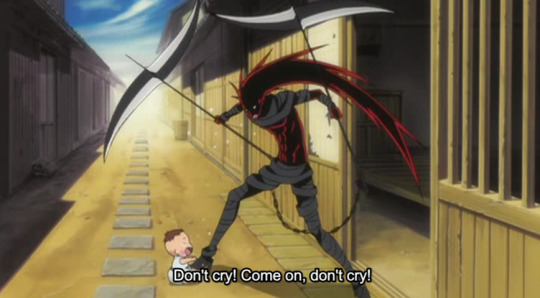
Ep opens with Hisagi Naruto-running through the woods while Kazeshini cackles, so I guess that counts as a strong start, but it’s literally just footage they re-used from the episode where they fought back during the Muramasa rebellion. I gotta say, if I went to shinigami school and trained with the blade, etc, and then found out my sword spirit was a crazy murderer who hated me and would absolutely not help me in any situation, I would take some night courses and become a shinigami bartender. I would not “deal with” some stupid death pinwheels that scared me. I would simply pursue another line of employment. I would also not get the sex number tattooed on my face, so these are just a few of the ways I am different from Hisagi Shuuhei.
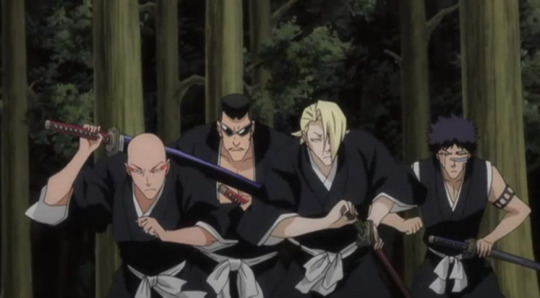
I guess that was supposed to be an actual flashback, because then it cuts to Ikkaku, Iba, Izuru, and Shuuhei running through the woods. What a friggin’ dream team. Ikkaku and Iba are on exposition duty, and thus we learn that they are off to Rukongai to fight some sword beasts who are starting shit, as is their wont. They get attacked by Kazeshini and Hisagi sighs and tells everyone else to go on ahead with exactly the same inflection as an absentee dad in an 80′s film who just remembered he can’t go to the game because he has to pick up his son from soccer practice. It’s now Kira’s turn to provide some exposition, and he explains to Iba and Ikkaku that Hisagi’s zanpakutou is, as they say, a huge bitch. He voiceovers his own flashback to the time he totally beat Kazeshini and looked super cool. Iba and Ikkaku agree: Wow. Kazeshini sure is a huge bitch.
Shuuhei and Kazeshini fight for a while, but Shuuhei is so, so tired, and finally he’s like “Dude, I am at work, can we do this later?” and Kazeshini gets mad and pouty.
I really like the next part where Hisagi runs up to some Kira and Iba who are standing around in Rukongai, which is smoking, and says “Sorry I’m late.” Ikkaku is nowhere to be seen draw your own conclusions. It is no wonder the Rukongai dwellers hate Soul Reapers, I would definitely be printing up anti-shinigami propaganda if I lived in the Rukon.

I am sorry, I can’t stop taking screenshots of these goons, I love them. Ikakku shows up and says they were all too late, it was like this when we got here. Whatever you say, man.
Cut to a cliff where Kazeshini is gazing over the smoking town, and Haineko, Hozukimaru and Wabisuke roll in to give him some life advice. Look, the best thing about this arc is the great care and attention they give to pointedly ignoring that no one ever made up zanpakutou for some of the shinigami. Maybe you won’t notice, they say, that we never show Iba’s zanpakutou. He surely has one and it definitely has a name, look, here’s a catgirl! God, I would give my liver to get the backstory on Iba’s zanpakutou. I hope it’s just Ray Smuckles from Achewood.
It turns out this is an intervention, the other zanpakutou are as sick of Kazeshini’s shit as Hisagi is. They are literally just like “what is wrong with you man?” and then say he can’t come to the cool parties down in the zanpakutou cave anymore if he can’t get his shit together. (Do you think Byakuya is still invited to those? I mean, I am sure he doesn’t go). Kazeshini yells “You’re not MY DAD!” and jumps off a cliff.
Kazeshini attacks Hisagi again while Hisagi is in the middle of a fight with an actual sword beast. Hisagi is really fed up by this time, he’s busy and this is getting pretty tiresome (to us, the audience as well). He throws Kazeshini through a wall, yells “I don’t have time for this” and gets back to business. Kazeshini is upset because no one is paying attention to him and goes looking for Hisagi. What he finds instead is a sword beast murdering a dude. The sword beast calls Kazeshini a dog of the Soul Reapers so Kazeshini stabs him in the friggin’ face, the first time this episode we have seen Kazeshini’s commitment to murderin’ dudes. Of course, the sword beast was in the middle of his own murder at the time, and the poor dude bleeding out on the floor begs Kazeshini to take care of his infant son.
I am presuming it’s his son. He could have been stolen that baby. Maybe they were just roommates. I don’t know how babies work in Soul Society and every time I think about it, it gives me a headache. Anyway, the baby has appeared.
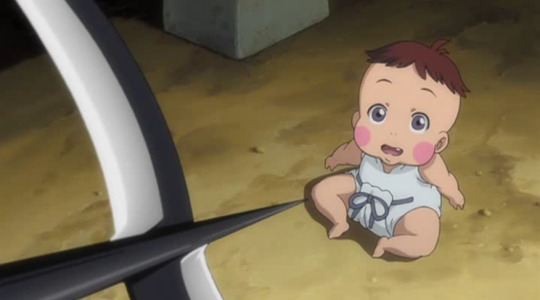
To be perfectly honest, the dad didn’t even look that hurt and Kazeshini doesn’t know how much blood people are suppose to have in them, I bet he was just faking to get rid of this baby.
Kazeshini deadass looks this baby in the eyes and in a gravelly Clint Eastwood voice says “Look, kid, the only thing I am interested in is reaping lives” and I laughed my ass off, this is the actual funniest thing that happens in this episode.
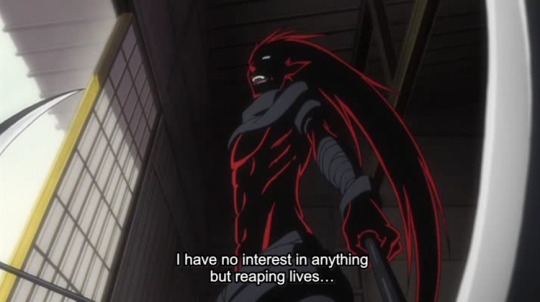
The baby starts crying because Kazeshini won’t let him touch his death pinwheels, and the Soul Reapers hear it and start to run over. Kazeshini yells “I guess I have no choice!” grabs the baby and scrams. He had... no choice. He is very committed to murders, but he had no choice but to leave the baby sitting on the ground for 30 seconds before some authority figures ran up and found it. No. Choice.
GOD, I would give anything to see Iba, Ikkaku, Kira and Hisagi try to take care of a baby. Iba would try to get the Shinigami Women’s Association to take it and they would refuse. He would put the baby in sunglasses and one of those chest wraps. Ikkaku would try to teach the baby to fight, while Kira shouted “You can’t teach a baby to fight!” Hisagi would try to read a book on childhood development and get some Bad Ideas. Eventually, Ukitake would show up and take the baby away from them. I would give you all the money in my pocket for this, Bleach writers, but NO.
Kazeshini tries to talk the baby into going off and getting a job or something, but that doesn’t work. He tries to abandon it and... fails, I guess. He goes back to the cliff where the other zanpakutou show up to laugh at him and refuse to help, as well they should.
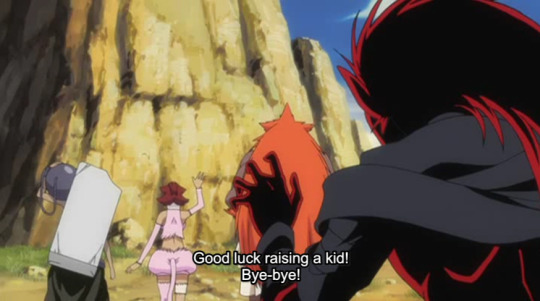
The baby cries because Kazeshini won’t let him touch his scythe thingies, so Kazeshini let’s him touch them. a) of all, this is not how parenting works, Kazeshini, and b) why does Kubo/whoever wrote this episode think babies love sharp objects, because this is exactly how the scene where Zaraki meets Yachiru goes. I have had babies. Do not get me wrong, babies love things they can hurt themselves with, mine particularly loved power cables, but I do not think they are generally interested in weaponry, but then again, this is Bleach, so it’s probably just a sign that this kid is going to grow up and be a Soul Reaper. I think this is the part of the episode where I started speculating where the baby would get his ‘69′ tattoo, because clearly, the cycle continues, and my husband made me shut up because he didn’t want to think about it, but search your heart, you know it’s truuuuuuuuue. If they ever do a Bleach Next Generation series, this kid better show up and he better have that tatt.
The baby pees on Kazeshini.
There’s a montage of the baby further harshing Kazeshini’s Hisagi-bothering lifestyle.

Then, Kira tells Hisagi that “there’s a rumor going around the zanpakutou about yours.” Why are the zanpakutou telling Kira their rumors. Do Kira and Wabisuke hang out? I mean, all of these takes place within, like, 2 hours, I think? While everyone’s on a mission? I don’t care, now I’m just mad that we got robbed of a Kira & Wabisuke episode where they listened to a bunch of The Cure together and made a poetry chapbook.
Kazeshini really, really wants to fight Hisagi at this point, but the baby has fallen asleep. He tries to leave it on a roof, but the baby rolls off the roof. Maybe it’s because I have kids, I dunno, but none of these antics are really funny to me, they’re just dumb. Literally, why doesn’t he just leave it on the ground?? All of these jokes revolve around him being an idiot and not caring about the baby, but he could have not just taken it in the first place. (there’s one point where he does try to hook it on a tree branch and that was funny, because we always talked about putting hooks on the wall that we could hang the babies on, just, like, for a minute, they would have loved it). Anyway, he spots a shed on the edge of town and decides that would be the perfect spot to abandon a baby while he murders his master.
Fight time! God, I love a Scooby Doo sequence where you have different characters running up and down streets and in and out of doorways, and there is a delightful one of Iba, Ikkaku, Kira and Hisagi fighting sword beasts. I cannot believe I am more delighted by the lieutenant parts of this episode than the Kazeshini parts, but that’s just who I am now.
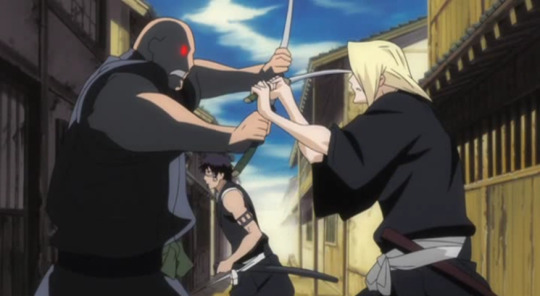
We actually get to see some competent Hisagi fighting. Kazeshini is about to jump in and mess him up again, but the baby starts crying back in the shed. (it’s so far away??? How does he even hear it???) I guess he cares now, so he runs back to go get his kid. In the meantime, a nice lady has found the baby and is attempting to comfort it, except that the moment Kazeshini slides into the doorway she... drops the baby? The baby is comforted by hugging Kazeshini’s pointy shoe, and Kazeshini realizes that perhaps this woman will be an incompetent enough parent to take over in his stead.
Oh no a sword beast attacks him from behind! I guess it’s the one I thought he killed earlier, because it says “Oh, it’s you, the Soul Reaper’s dog!” Kazeshini isn’t even good at murdering, wtf? This episode is dumb.
Anyway, Kazeshini stabs the sword beast, and it definitely dies this time. He has an intense moment of realization that saving people is almost as cool as murdering people, and tells the lady to take the baby and run. The baby cries while a very intense guitar chord plays.
Kazeshini finds Hisagi, who is killing the last of the sword beasts, and is like “Okay, I promise not to attack you from behind can we fight now?” The episode then goes full-bore D R A M A, where they say “Reap--!” at the same time and there’s a smash cut to T H E S K Y and a woman singing a lullaby with some haunting reverb and then it intersperses imagery of the woman comforting the crying baby in a field full of floating dandelion seeds and Kazeshini and Hisagi fighting. At this point, if the episode doesn’t end with them each dying on the ground, I am going to be deeply disappointed. (Spoiler: I am deeply disappointed).
There’s a pretty good death pinwheel-on-death pinwheel fight, although it’s short. Hisagi stans gotta take what they can get, I guess. Anyway, at least Kazeshini ends up lying in a pool of his own blood, where he mumbles “When I turn back into a regular zanpakutou... what will we fight for?” and Hisagi replies “We will fight to protect people” and Kazeshini makes this face:

This was the second funniest part of this episode.
He turns back into swords and that’s the end.
In canon, the bit about Hisagi fearing his own blades is an interesting bit of character building, that fits in nicely with his admiration of Tousen, and the fact that he’s a bit of an artsy, writer type. It builds up the idea that Soul Reapers are not just bloodthirsty warriors, but people with morals and concerns, that they fight to protect, just like Ichigo does.
This episode in no way contributes to that idea. It’s more like the writers say, “Hey, people love Grimmjow! Let’s make a yell-y guy who likes to kill people!” Why does Kazeshini want to murder so badly? Who hurt him? He’s part of Hisagi’s psyche, but why? Why are either of them like this? In my head, prior to this, I could think of Kazeshini as a disembodied voice encouraging the escalation of violence. Hisagi was weak and powerless as a child, and then, in one of his first command positions, had a group of underclassmen in his care brutally attacked and a friend killed. I can see him having urges to go to extremes-- to get revenge, to kill monsters before they can kill innocents, but he fears these urges within himself, he fears becoming a monster.
The way this filler arc portrays Kazeshini doesn’t fit. It doesn’t work. Kazeshini is just a dirtbag who wants to kill and attack from behind and then they give him a baby and they don’t even have anything interesting to say about any of this. It’s honestly just disappointing. That’s right. I’m disappointed in you, Bleach Filler Episode about Kazeshini Toting a Baby Around. C-. It’s not quite the level of disappointment I had over the one where Renji blew up Urahara’s van, but Hisagi fans really don’t get thrown a lot of bones, and they deserve better than this.
Oh, and then in the next episode voiceover, Wabisuke theorizes that the baby was Kazeshini’s lovechild. We definitely do not have time unpack all that, so let’s end it here.
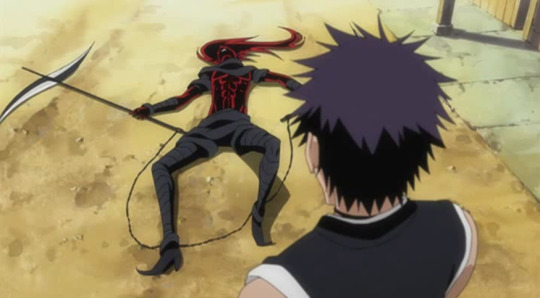
#sword beasts arc#bleach filler#shuuhei hisagi#kazeshini#i will say that kazeshini's character design does look like something shuuhei would doodle in the margins of his 4th grade math homework
13 notes
·
View notes
Text
MATISSE AND RUSSIAN ICONS: The Metaphysics of Pictorial Space
"He paints 'images'" and in these "images endeavors to reproduce the divine. To attain this end he requires as a staffing point nothing but the object to be painted (human being or whatever it may be) and then the methods that belong to painting alone, color and form." ---- Wassily Kandinsky, writing about Henri Matisse [1]
Matisse’s Introduction to Russian Icons
There is a remarkable convergence between the work of Henri Matisse and that of the Russian icon painters. Our topic in this essay is precisely this convergence, and not the influence which icons may have had on Matisse. In the case of an artist of Matisse's caliber, influences -- although present and not without interest -- are superficial compared to that which gives quality to the art; because at a deeper level, every great artist is original, in the sense that the art draws its strength from direct contact with nature - and in Matisse's case, with nature at her deepest level, where one drinks from the very wellspring of being, of existence. That is why Matisse said that to be an artist one must rid oneself of prejudicial habits of vision and learn to look at life with the eyes of a child, and draw one's strength from the existence of objects. [2]
Matisse was already moving in a certain direction before he went to Russia, and the icons he saw there made a strong impression on him because he was ready to see them, because he was travelling on a path that converged with them. As Matisse himself put it, "You surrender yourself that much better when you see your efforts confirmed by such an ancient tradition. It helps you jump over the ditch."[3] It is not wrong to say that the icons influenced Matisse; but it is truer, and more to the point, to say that they confirmed his originality.
A certain kinship can be noted between ancient icons and Matisse's paintings even before the artist visited Russia. The Painter's Family was finished just before Matisse left for Moscow in October, 1911; yet the brilliant reds and black-and white checkerboard patterning are already reminiscent of icons. Matisse had very likely seen icons in 1906 in the exhibition organized by Sergei Diaghilev as part of the Salon d'Automne, and was probably familiar with more examples of iconography through reproductions. Interest in icons was "in the air" at that time. The 1911 Salon des Independants included works by several contemporary Russian artists working in a neo-Byzantine or archaic style; Guillame Apollinaire said they seemed to have "fooled the centuries."[4] Painters and patrons of contemporary art in Russia at this time, like Riabushinskii and Oustrukhov, collected icons.
The Conversation was another picture painted before the trip to Moscow. Shchukin, writing to Matisse on August 22, 1912, said of this picture: "I often think of your blue painting (with two figures)... It reminds me of a Byzantine enamel, its colors are so rich and deep."[5] Matisse's first exposure to Byzantine art may have come through Signac. When the divisionist travelled to Venice and saw the Byzantine mosaics in San Marco, he decided to change his dots to squares. He brought back a number of postcards which he doubtless showed his disciple in St. Tropez. The impression of Byzantine mosaics seems to have stayed with Matisse. After his death, several photographs of the interior of Hagia Sophia were found pinned to the wall of his apartment in Nice.
Matisse arrived in Moscow on October 23, 1911. The next day, he visited Ilya Ostroukhov, painter and collector and "patron" of the Tretiakov Gallery, whom he had met in Paris, and asked to be shown his collection of Russian Icons. A day later Oustroukhov recounted the incident:
"Yesterday evening he visited us. And you should have seen his delight at the icons. Literally the whole evening he wouldn't leave them alone, relishing and delighting in each one. And with what finesse! ... At length he declared that for the icons alone it would have been worth his while coming from a city even further away than Paris, that the icons were now nobler for him than Fra Beato... Today Shchukin phoned me to say that Matisse literally could not sleep the whole night because of the acuity of his impression."[6]
"From that moment on, "writes Pierre Schneider, "Matisse spent all his time going around to visit churches, convents, and collections of sacred images, his excitement at the first encounter not having diminished one iota. He shared it with all who came to interview him during his stay in Moscow." [7]
On Oct. 31, Ilya Ostroukhov wrote to D.J. Tolstoy, the curator of the Hermitage Museum: "Matisse is here. He is deeply affected by the art of the icons. He seems overwhelmed and is spending his days with me frantically visiting monasteries, churches and private collections." [8]
"They are really great art," Matisse excitedly told an interviewer. "I am in love with their moving simplicity which, to me, is closer and dearer than Fra Angelico. In these icons the soul of the artist who painted them opens out like a mystical flower. And from them we ought to learn how to understand art." [9] What is one to make of this expression of heartfelt admiration for the old Russian icons? From these icons "we ought to learn how to understand art." This is a very strong statement. It sounds exaggerated. Yet, Matisse was habitually reserved and cautious in his statements, not prone to exaggeration. Our endeavor in these pages may be defined as an investigation of the meaning and validity of this assertion.
"From them we ought to learn how to understand art." Not one particular kind of art, but art in itself. The icons offered Matisse a revelation of what art is. This goes deeper than stylistic "influence." To speak of Matisse imitating or being influenced by icons is to miss the point. His relationship with them is on a deeper level. In them he has recognized, in an especially pure form, the essence of art. Art is, for Matisse, essentially a manifestation of the life in which both nature and the artist participate. Throughout his career Matisse was a truly original artist. This does not mean that one cannot find in his work what are commonly called "influences" of other artists, in this case the Russian iconographers. It means that Matisse's art is directly rooted in the place where art originates, in the wellspring of being which we mentioned at the beginning. Precisely because he strives to be true to nature, Matisse converges with the icon painters.
We know that before and after his trip to Moscow, Matisse responded enthusiastically to other forms of what were known as "primitive arts" – Persian miniatures, Japanese prints and African sculptures. But the icons held a special importance for two reasons.
The first was articulated by Matisse in several interviews in Moscow. On Oct. 27, he praised the monumentality and majesty of the Kremlin churches, and the reporter added: "The pure, rich colors of the old icons, their sincerity and immediacy, seemed a genuine discovery to him." Then he quotes Matisse: "This is primitive art. This is authentic popular art. Here is the primary source of all artistic endeavor. The modern artist should derive his inspiration from these primitives." [10] Matisse confided to another interviewer: "The icons are a supremely interesting example of primitive painting. Such a wealth of pure color, such spontaneity of expression I have never seen anywhere else. This is Moscow's finest heritage. People should come here to study, for one should seek inspiration from the primitives. An understanding of color, simplicity -- it's all in the primitives. It is the best thing Moscow has to offer. One should come here to learn because one should seek inspiration from the primitives."[11]
Matisse links the "primitive" quality of the icons with their authentic popularity. That is to say, this art was still in use and understood popularly. It worked. In Matisse's view, art is not to isolate itself in museums, but to "participate in our life."[12] Decades later, in a letter to Sister Jacques-Marie regarding the Chapelle du Rosaire at Vence, Matisse wrote: "I would like it to be useful. Do you think it could be useful?"[13] What does Matisse mean when he speaks of art "working" or being "useful"? This question brings us to one of the key connections between Matisse and the iconographers. In his conception and theirs, the role of art is therapeutic. It seeks to "relieve," to "alleviate," to "heal." How it does this we will see a little further on, but for now let us just say that the instrument of this "healing" is light."[14] "Light," says Schopenhauer, "is the most delightful of all things; it is the symbol of everything that is good, everything that heals. In all the religions of the world it symbolizes eternal salvation."[15] (Let us remember that, etymologically and theologically, salvation means healing.) The icons held a special importance for Matisse because they are an art whose specific function is to heal whoever contemplates them, by means of light; and this use is truly popular, understood by all the faithful who approach them. Presently we shall look into the nature of pictorial light, color and space, and then we shall see what this light has to do with healing.
Before we get to that, however, we can surmise a second reason for the special importance which the icons held for Matisse. Whereas Persian miniatures and Japanese prints were foreign to the West, icons were part of the heritage of western Europe until the late middle ages, in Romanesque and early Gothic painting and sculpture. The whole of western medieval art developed in direct or indirect dependency on Byzantium, and there was a rich exchange of formal ideas between East and West throughout the Middle Ages. Furthermore, the art of the great Venetians -- Titian, Veronese and Tintoretto -- has roots in Byzantine iconographic art, the influence coming by way of Crete. The Venetian legacy, with its Byzantine formal roots, was in turn widespread in western Europe, coming to Matisse via Chardin, Courbet and Cezanne. Thus while the icons were, like other eastern painting, impressively and revealingly different from "the art of the museums," they were nevertheless a significant part of the family tree of western art. This peculiar balance must have been especially stirring to the sensibilities of the young painter who had spent so much time studying western masterworks in the Louvre.
Space in Russian Icons and in Matisse: preliminary considerations
It is often said that icons and Matisse's late paintings and cutouts, and for that matter Japanese prints and Persian miniatures as well, are "flat." Such a statement can be either ambiguous or mistaken, depending on the understanding and intention of the speaker.
The intended meaning of the word "flat" may simply be "unmodelled." Indeed, the modelling or shading of volumes in these works is usually slight, and is sometimes suppressed altogether. They are executed largely in line and flat tone. But that does not at all diminish the plenitude of the volumes! Volume is expressed in better ways. As Matisse explained to a visitor in his studio, who remarked on the volumetric quality of the Barnes Mural, "Yes, but in reality the painting is made in flat tones, without any gradation ... It is the drawing, and the harmony and contrast of the colors, that form the volume, just as in music a number of notes form a harmony more or less rich and profound according to the talent of the musician who has assembled them."[16] So let us not say that these pictures are flat, even if we only mean to refer to the flatness of the tones; the paintings are emphatically not flat.
Sometimes Matisse's pictures and the icons are said to be "flat" because they lack Albertian perspective -- as if space were dependent upon such perspective. This, too, is an error, as will be made clear by our investigation of the nature of pictorial space. This investigation will begin in the following paragraphs, and will be taken up again and deepened later in this essay.
Our experience of space in the world is largely kinesthetic, dependent upon the sensation of our bodies' movement, our feeling of the forces of gravity and equilibrium, and the ever-varying correlation between optical stimuli and eye movements -- including binocular convergence, accommodation to focal distance and parallax.[17] This elementary fact is forgotten by those who think that space is achieved in painting by optical verisimilitude, with its shading of volumes and its atmospheric and linear perspective approaching the effect of photography. An arbitrary "snapshot," the epitome of a purely optical impression, gives us a jumble of variously shaped tones removed from their spatial context. From being accustomed to viewing such flat images, whether in photographs or in academic "realist" paintings, we develop a "space blindness." The eye seizes upon recognizable details and, by a conventional sort of "leap of credulity" accepts the flat image as referring to things one has experienced in the world. The difference between flatness and space collapses.
The opposite happens in great paintings. There our experience of space is heightened. In a masterpiece of Matisse -- or of Rembrandt or Raphael, Giotto or Picasso or Mondrian, for example -- a feeling of depth is created by the pushing and pulling of shapes and colors. All the lines and tones are organized, at once musically and architectonically, in such a way as to give the viewer movement into and out of depth; and this depth is made palpable by the tension between it and the flatness of the pictorial surface. The real experience of space in a painting is not quantitative, dependent upon the suggestion of deep vistas; rather, it is qualitative, dependent upon the resonance of the tension between the flat plane and all the pushing and pulling planes of color. The difference between flatness and space is not collapsed in painting; it is amplified.
Two Views of Matter
The belief, so rampant in the academic art of the nineteenth century and still widespread today, that a painter can "copy" appearances -- as also the trust we put in the camera, a machine, to reproduce the way things look - betrays a tendency to reduce the material world to mere materiality, something which can be considered apart from spirit. When the churches of the West split from the Christians of the East at the end of the first millennium, they set off on a road of increasing rationalism, gradually losing the mystical vision of the world which the Orthodox in the East retained. Descartes' dualistic philosophy is a significant milestone in the western trend, although the direction was evident centuries earlier, notably in the medieval scholastics. Descartes held that matter is mere extension and that spirit is only found in our own minds or in heaven. To the extent that painting was influenced by this notion, it had to deal with the world, its light and its space, externally, mechanistically. To be sure, there was never any lack of allegory, or poetic or religious subject matter; but things were ontologically impoverished, rendered inert.
The Orthodox tradition knows no separation between nature and grace such as prevails in western thought in the wake of scholasticism. In the eastern view, as expressed from ancient times by Gregory of Nyssa, Maximus the Confessor and a host of others, matter is thoroughly and dynamically irradiated by the divine energies, apart from which matter would not exist. These energies are uncreated; they are God Himself. By the "luminous force"[18] of His logoi or "thought-wills" God creates and orders, sustains and governs all things in an intimate, dynamic relationship with each creature, operating within the creature. This inner life of nature blazes forth as what Saint Isaac of Syria calls "the flame of things." St. Maximus says: "The unspeakable and prodigious fire hidden in the essence of things, as in the bush, is the fire of divine love and the dazzling brilliance of His beauty inside every thing."[19] Icons are above all concerned with this inner life, this luminous force, this fire within creation.
Matisse similarly insists on the necessity for artists to be in touch with the inner lift of things. "The time spent at school should be replaced by a free stay in the Zoological Gardens. The pupils would gain knowledge there in constant observation of embryonic life and its vibrations. They would gradually acquire that ‘fluid’ which great artists come to possess." Matisse, like the icon painters, recognizes the need for a certain asceticism, a purification of the power of vision, in order that one may see the light and life within nature. Raymond Escholier describes how, relaxing in his garden in Nice, Matisse smiled at the crystal-clear light: "Everything is new," he said, "everything is fresh, as if the world had just been born. A flower, a leaf, a pebble, they all shine, they all glisten, lustrous, varnished, you can't imagine how beautiful it is! I sometimes think we desecrate life; from seeing things so much, we don't look at them any more. Our senses are wooly. We feel nothing. We are spoiled. I think that to really enjoy things, it would be wise to deprive ourselves of them. It is good to begin by renouncing, force oneself from time to time to take a cure of abstention."
The artistic process
Matisse describes the work of a painter as an inner process, culminating in the rhythmic and life-filled expression of an internal vision:
The first step toward creation is to see everything as it really is [dans sa verite], and that demands a constant effort...
A work of art is the climax of long work of preparation. The artist takes from his surroundings everything that can nourish his internal vision... He enriches himself internally with all the forms he has mastered and which he will one day set to a new rhythm.
It is in the expression of this rhythm that the artist's work becomes really creative. To achieve it, he will have to sift rather than accumulate details, selecting for example, from all possible combinations, the line that expresses most and gives life to the drawing; he will have to seek the equivalent terms by which the facts of nature are transposed into art....
That is the sense, so it seems to me, in which art may be said to imitate nature, namely, by the life that the creative worker infuses into the work of art. The work will then appear as fertile and as possessed of the same power to thrill, the same resplendent beauty as we find in works of nature.
Great love is needed to achieve this effect, a love capable of inspiring and sustaining that patient striving towards truth, that glowing warmth and that analytic profundity [depouillement profond] that accompany the birth of any work of art. But is not love the origin of all creation? [20]
This love, which is necessary for artistic creation, has a divine aspect:
Nothing is more gentle than love, nothing stronger, nothing higher, nothing larger, nothing more pleasant, nothing more complete, nothing better in heaven or on earth -- because love is born of God and cannot rest other than in God, above all living beings.[21]
The rhythmic quality of lines, tones and shapes, which Matisse insists on, is necessary for experiencing the vital energy at the heart of existence. The rhythms are perceived in nature by the artist who has purified his vision so as to be able to "look at life as he did when he was a child."[22] The artist must interiorize these rhythms, "until the object of his drawing has become like a part of his being, until he has it within him and can project it onto the canvas as his own creation."[23] In this sense the object is set forth in the work of art according to a new rhythm. There is a life that fills all creation, a life which is the manifestation of a great love. An artist can make a beautiful work of art, a work which manifests the splendor, the love-impelled vitality of nature, only to the extent that he reverently attends to reality "with the eyes of a child."
Matisse's approach is similar to that of the icon painters. They likewise expose themselves at length to that which they want to portray, until they can draw its traits not from the outside world but from deep within themselves. The Orthodox tradition holds that one can only see the uncreated light of divinity by being oneself transformed into light. Hence the iconographers must be ascetics, must purify their vision and become themselves filled with light. Then they will see all things as filled with light; they will walk in a divine space, the space of the kingdom of heaven which is within them. The space and the light are one; and all things are light, as an iron held in fire becomes fire. The icon painter expresses all this from within, expresses a space which is identical with light-energy and which does not recede from us, but rather opens out toward us. The saints who inhabit this space are, in the words of St. Macarius of Egypt, "all face and all light."
Let us look at an icon of Saint Nicholas. One of the most pronounced elements in the design is the relation among the crosses on the saint's omophorion [part of the outer liturgical vestment of a bishop]. They move counterclockwise around his shoulders. The symmetrical placement of light and dark shapes immediately to the right and left sides, respectively, of the saint's neck, ensures the movement of space around his head and the return of this movement on the left side, where the cross moves downward and toward the right to complete the spatial circle. The opposition between the downward and rightward movement of the left cross and the upward and rightward movement of the right cross is mediated by the strict parallelism of their constitutive parts, while the abrupt change in direction from the former to the latter is explained (and caused) by the abrupt collision of the omophorion with the forcefully rectangular shape of dark robe at the center of the icon. The vector of the left cross ricochets off the upper edge of this dark rectangle to become the vector of the right cross. The exceedingly great power of this dark rectangular shape, which is able to stand firm beneath these crosses (themselves strong and violent in their contrasts) is felt to issue forth from the blessing hand which extends into this shape, and thus to be an amplification, a visual proclamation, of the power emanating from the peaceful gesture. Thus the icon shows us simultaneously both the gentleness and the power of the blessing. At the same time, the Gospel book bounds forward from the dark rectangle, repeating its shape while being pushed forward by the visual action of the white omophorion. The color of the book relates it directly to the blessing hand, as well as to the head. The book pulls gently to the right, assisting the overall counterclockwise rotation of the space in the icon. This movement of space (and concomitantly of volume, since neither exists apart from the other in painting) is seen also in the subtle asymmetry of the head (characteristic of icons) -- in the placement of its features and the modeling of its volumes. It is hardly necessary to point out that all the lines and shapes in this icon, all the highlights in the dark robe and even the subtlest nuances of the modeling in the hand and face, as well as all the chromatic and tonal intervals, are rhythmically and harmonically interrelated.
In a testimonial of 1951, Matisse tells of how, in the Chapel at Vence, he wanted to do the same thing he had always done in his canvases: "In a very restricted space- the width is five meters --I wanted to inscribe a spiritual space as I had done so far in paintings of fifty centimeters or one meter; that is, a space whose dimensions are not limited even by the existence of the objects represented."[24]
This spiritual space is a kind of plenitude that is plastic, i.e. truly felt. It does not imitate some externally perceived space. And it is achieved through color -- color which, laid on in flat planes, provokes light "as one uses harmonies in music."[25] "Color helps to express light, not the physical phenomenon, but the only light that really exists, that in the artist's brain."[26] "Most painters require direct contact with objects in order to feel that they exist, and they can only reproduce them under strictly physical conditions. They look for an exterior light to illuminate them internally. Whereas the artist or the poet possesses an interior light which transforms objects to make a new world of them -- sensitive, organized, a living world which is in itself an infallible sign of divinity, a reflection of divinity."[27] Because the light-filled space that the artist finds within himself reflects the divine, it brings with it a communion with nature, and gives birth to art which is true to nature. "Awakened and supported by the divine, all elements will find themselves in nature."[28]
Our investigation thus far enables us to see the profound truth of Kandinsky's words about Matisse, quoted at the head of this essay: "He paints ‘images’" and in these "images endeavors to reproduce the divine. To attain this end he requires as a starting point nothing but the object to be painted (human being or whatever it may be) and then the methods that belong to painting alone, color and form."[29]
For Kandinsky, the freeing of art from the imitating of appearances allowed it to revert to its essence of line and pure tone. Matisse, committed to this most universal mode of painting, whose revival in France had been pioneered by Gaugin and Van Gogh, said to Teriade in 1936: "When the means of expression have become so refined, so attenuated that their power of expression wears thin, it is necessary to return to the essential principles that made human language. These are, after all, the principles that ‘go back,’ that restore life, that give us life. Pictures that have become refinements, subtle degradations, dissolutions without energy, call for beautiful blues, beautiful reds, beautiful yellows -- materials to stir the sensual depths in men. This is the starting point of fauvism: the courage to return to the purity of the means."[30] In a postcard to Manguin, sent from Moscow in 1911, Matisse had compared the icons to fauvist painting.[31] Later in life, reminiscing about his reaction to divisionist theories and rules, Matisse said he had to find a way to compose with the drawing in such a way as to enter directly into the arabesque with the color.[32] He stated that in the fauvist reaction against the diffusion of local tone in light, "Light is not suppressed, but is expressed by a harmony of intensely colored surfaces."[33]
In a letter to Charles Camoin in 1914, Matisse writes of his enthusiasm for a Seurat, intensely colored, with a band of blue dotted with violet at the top and the bottom, functioning like the repoussoir of the old masters. He has the Seurat on his wall alongside a photograph of Delacroix's "Jacob Wrestling with the Angel," which his daughter prefers because of its overall life. Comparing the two, Matisse notes that the Seurat remains grand, but "Delacroix's composition is more entirely created, while that of Seurat employs matter organized scientifically, reproducing, presenting to our eyes objects constructed by scientific means rather than by signs coming from feeling. As a result there is in his works a positivism, a slightly inert stability coming from his composition, which is not the result of a creation of the mind but of a juxtaposition of objects. It is necessary to cross this barrier to re-feel light, colored and soft, and pure, the noblest pleasure." The Delacroix, with its vital arabesque, is ultimately more significant to Matisse.[34]
In Matisse's Red Interior (Note: illustration 2 will be added), every line, every shape, every tone -- each of the pictorial elements -- is rhythmically related to all the other elements. The blue oval of the table top, pushing in front of the field of warm reds and yellows, jostles the lower left corner of the rectangle and pops the red shapes of the tomatoes to the fore. The contours of the table swing counterclockwise, descending on the left and ascending on the right to push the vase over to the left, flattening the right contour of the vase while the left contour bulges in response. The oval table is echoed above by the medallion enclosing a woman's profile, while the yellow medallion in turn is answered by the vertical yellow rectangle of the door standing ajar. This yellow door pulls strongly to the right, all the way to the edge of the canvas, yet resists conformity to the straight edge; the upper part of the door leans to the left, back toward the yellow medallion, and thus initiates a large counterclockwise rotation of the whole space of the painting, from the door to the mirror and then back down to the table, an amplification of the rotation of this very table. Balancing this rotation, however, is the movement of the great plane of red with its black zig-zags, from lower left to upper right, followed by the action of the yellow flowers outside, whose shape, a more active variation of that of the flowers in the vase, provides a counterpoint to the inclination of the yellow door.
Note that the light in the painting is a radiant encounter of fields of color, ceaselessly enriched by the ebb and flow of all the powerful and subtle exchanges that go on among the pictorial elements. There is not even any suggestion of incident illumination. Nor does the ample space of the painting make any allusion to perspective. The painting indeed manifests that "interior light which transforms objects to make a new world of them - sensitive, organized, a living world which is in itself an infallible sign of divinity, a reflection of divinity."[35]
The painting unfolds rhythmically as an organic whole in space and in time. Or rather, the space and time are born from the same unfolding. The painting is alive and active, manifesting the energy, the love, which creates and sustains nature, and with it space and time. The organic unfolding of all the elements within the painting is continuous with an unfolding of the painting toward the viewer -- the painting's splendor, clarity or radiance. The plenitude of being which the work manifests expands and radiates to illumine a beholder standing at even a distance of fifty or a hundred feet.[36] The painting is not limited by the dimensions of its frame. This expansiveness is a function of the mysterious reality- which painters call the picture plane: when all the lines, shapes and colors are interrelated in a dynamic and harmonic space/time equilibrium, the painting exercises a luminous presence which faces the viewer. The painting is "all light and face." We see here the true coincidence, the coinherence, of space, light and the picture plane. They are one reality, and that reality is an event, an event of transformation which, for Matisse as for the icon painters, manifests the divine.
Let us examine further this mysterious event which we call the picture plane. In painting, the picture plane cannot be taken for granted. It is not something one starts with, and which can be "preserved" or not, but something which must be achieved. Its achievement is simultaneous with the creation of pictorial space and light, because together they are constituent aspects of a single spiritual event. Matisse's colleague, Andre Derain, stated that color in painting does not come from the prism, but is a spiritual matter of inner life manifested by rhythm. Derain further observed that light in painting is not a principle of imitation, like illumination. Its purpose is not to illuminate objects, but to set the painting within its frame -- that is, to generate the picture plane. In a living painting, the rhythmic relation of lines, angles, shapes and colors results in what Derain described as a "paroxysm." The paroxysm is simultaneously the opening up of space and the breaking forth of radiance, of spiritual light, of real pictorial color. This paroxysm is thus tantamount to the event which is the picture plane. We see now that the picture plane is transcendent in its very essence. That is why it is so mysterious and hard to grasp. It only exists in an act by which it transcends itself. An infinity of pictorial space and light exists when, and only when, the picture plane exists. That is why in great painting the difference between flatness and space is not collapsed, but rather amplified -- and reconciled. It is also why when the picture plane is achieved, the surface on which the picture is painted feels right, and breathes the air of infinity, rather than feeling like a constriction or a limitation.
The joy of Matisse's knowledge of nature is the joy of a unitive knowledge which in its depth may be compared to conjugal knowledge. This joy lives on in the event of the picture plane, the paroxysm, ceaselessly renewed by the painting's rhythms. In this connection let us observe that the joyful light and space of the Orthodox icon are likewise that of a nuptial feast the feast of the eighth day of creation which is the fulfillment of God's espousal of his creation, now healed and transformed.
We can now see why icons are considered to be agents of inner, spiritual healing, why their light, their space, are therapeutic -- and why Matisse desired to create paintings that would have a therapeutic effect. The communion with nature, the participation in the divine, which is implicit in pictorial light and space, cannot but have a healing action. The event of the painting, the act of transcendence which constitutes the picture plane, the opening out of inner life and light, is itself the beginning of a process of spiritual transformation.
~ Endnotes:
1. W. Kandinsky, Concerning the Spiritual in Art. Intr. and tr. M.T.H. Sadler (New York: Dover Pub., 1977) p 17.
2. Jack Ham, ed., Matisse on Art. (Berkeley end Los Angeles: University of California Press, 1995) pp. 213, 218.
3. Ibid., p. 178.
4. Guillaume Apollinaire, "Les Russes," Gil Blas, April 22, 1911.
5. Cited in French in Alfred Barr, Matisse, his Art and his Public. (New York: Museum of Modern Art, 1951), p.555.
6. "Matiss v Rossii osenju 1911 Goda," Trudy Gosudarstvennogo ermitaza, vol. 14 (1973), pp. 167-84. Quoted in Pierre Schneider, Henri Matisse. (New York: Rizzoli) 1984, p. 303.
7. Schneider, pp. 303-304.
8. Ibid., p. 14
9. Jack Flam, Matisse: the Man and His Art. (Ithaca: Cornell University Press, 1986), p. 323.
10. "Matisse in Moscow," Utro Rossi, Oct. 27, 1911, in Y.A. Rusakov, op. cit., p. 288.
11. Quoted in Matisse on Art, p. 296.
12. quoted by Pierre Schneider in the catalogue: H. Matisse. Exposition du Centenaire. (Paris, 1970), p. 13.
13. quoted in French in R. Escholier, Matisse from the Life. (London: Faber, 1960), p. 203.
14. Pierre Schneider, Henri Matisse. (New York: Rizzoli,1984), p. 10.
15. statement recorded in C. Zervos, Cahiers d'art, 5-6, 1931.
16. Matisse on Art, p. 110.
17. A clear and extensive treatment of this can be found in the book by the nineteenth century sculptor, Adolf Hildebrand, The Problem of Form.
18. St. Gregory of Nyssa, "In Hexaemeron," P.G., XLIV, pp. 72-3.
19. Amb., P.G. 91, 1148c.
20. Jack D. Flam, Matisse on Art. (New York, 1978), pp. 148-149. The quotation is from an interview conducted by Regine Pernoud and published in Le Courier de l'U.N.E.S.C.O., vol. VI, no. October, 1953. The translation given here is Flam’s, but I have inserted some of the words of the original French in brackets where I feel this is required by the subtlety of Matisse's expression.
21. Henri Matisse, Jazz. (Paris, 1947), quoted in Flam, Matisse on Art, p. 113.
22. loc. cit.
23. Ibid.
24. Matisse on Art, p. 207.
25. Ibid., p. 178.
26. Ibid., p. 156.
27. Ibid., p. 89.
28. Ibid., p. 156.
29. W. Kandinsky, Concerning the Spiritual in Art. Intr. and tr. M.T.H. Sadler. (New York: Dover Pub., 1977), p. 17.
30. Matisse on Art, pp. 122-123
31. Schneider, 1984, p. 309.
32. Dominique Fourcade, ed., Henri Matisse: Ecrits et propos sur l’art. (Paris: Hermann, 1972), footnote, p. 93.
33. Matisse on Art, p. 58.
34. Fourcade, ed. op cit., footnote, pp. 93-94. Translation of part of the letter given in Matisse on Art, p. 275.
35. Matisse on Art, p. 89.
36. Pierre Bonnard advised painters to take their canvases outside from time to time and view them from at least thirty feet away in order to judge them properly. The ability of a good painting to carry over distance is to a surprising degree independent of the size of the canvas--- surprising, that is, until one understands the reason.
~
Lazarus James Reid
#matisse#art article#painting#Sergei Shchukin#Russia#jacob’s well#tretiakov gallery#Sergei Diaghilev#icons#the chapel of the rosary#matisse jazz
3 notes
·
View notes